Regulatory and Ethical Frameworks for Nurses
VerifiedAdded on 2020/10/22
|25
|8012
|404
AI Summary
This assignment delves into the regulatory and ethical frameworks that govern nursing practice in Australia. It examines the importance of mandatory reporting laws, confidentiality and privacy in healthcare, and the role of the Nursing and Midwifery Board of Australia (NMBA) in regulating the profession. Additionally, it touches on advance health directives, guardianship, and administrators, providing a comprehensive understanding of the ethical considerations that nurses must navigate in their practice.
Contribute Materials
Your contribution can guide someone’s learning journey. Share your
documents today.
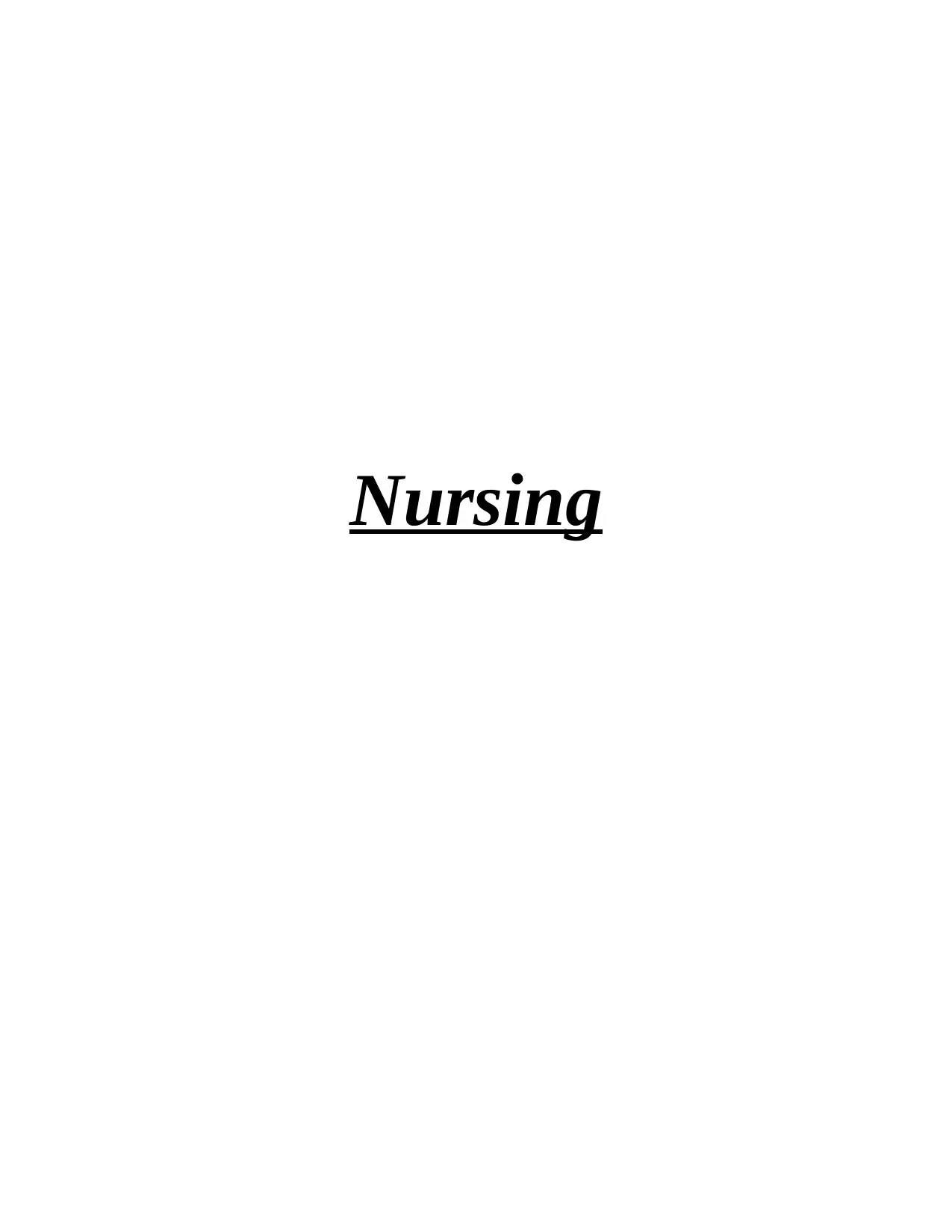
Nursing
Secure Best Marks with AI Grader
Need help grading? Try our AI Grader for instant feedback on your assignments.
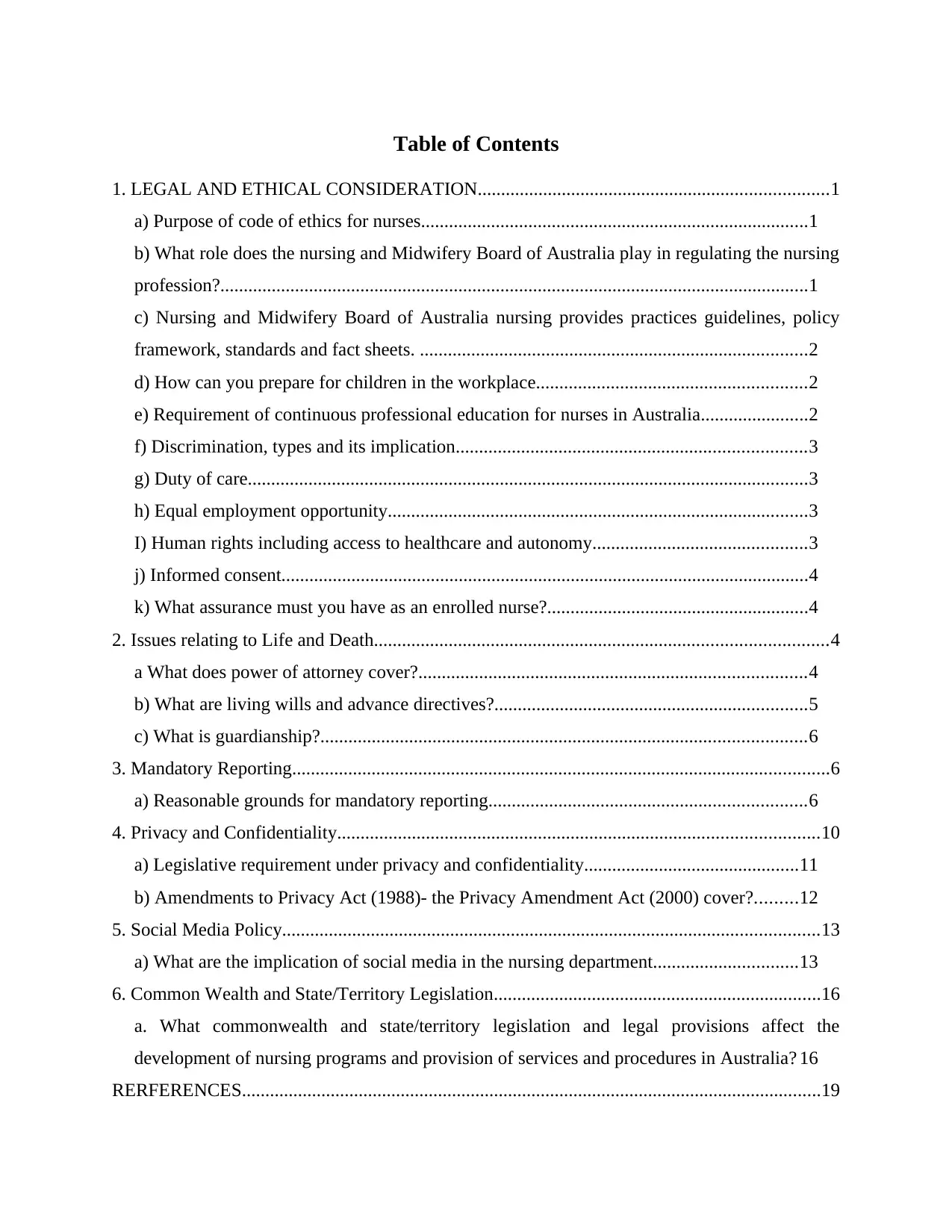
Table of Contents
1. LEGAL AND ETHICAL CONSIDERATION...........................................................................1
a) Purpose of code of ethics for nurses...................................................................................1
b) What role does the nursing and Midwifery Board of Australia play in regulating the nursing
profession?..............................................................................................................................1
c) Nursing and Midwifery Board of Australia nursing provides practices guidelines, policy
framework, standards and fact sheets. ...................................................................................2
d) How can you prepare for children in the workplace..........................................................2
e) Requirement of continuous professional education for nurses in Australia.......................2
f) Discrimination, types and its implication...........................................................................3
g) Duty of care........................................................................................................................3
h) Equal employment opportunity..........................................................................................3
I) Human rights including access to healthcare and autonomy..............................................3
j) Informed consent.................................................................................................................4
k) What assurance must you have as an enrolled nurse?........................................................4
2. Issues relating to Life and Death.................................................................................................4
a What does power of attorney cover?...................................................................................4
b) What are living wills and advance directives?...................................................................5
c) What is guardianship?........................................................................................................6
3. Mandatory Reporting...................................................................................................................6
a) Reasonable grounds for mandatory reporting....................................................................6
4. Privacy and Confidentiality.......................................................................................................10
a) Legislative requirement under privacy and confidentiality..............................................11
b) Amendments to Privacy Act (1988)- the Privacy Amendment Act (2000) cover?.........12
5. Social Media Policy...................................................................................................................13
a) What are the implication of social media in the nursing department...............................13
6. Common Wealth and State/Territory Legislation......................................................................16
a. What commonwealth and state/territory legislation and legal provisions affect the
development of nursing programs and provision of services and procedures in Australia? 16
RERFERENCES............................................................................................................................19
1. LEGAL AND ETHICAL CONSIDERATION...........................................................................1
a) Purpose of code of ethics for nurses...................................................................................1
b) What role does the nursing and Midwifery Board of Australia play in regulating the nursing
profession?..............................................................................................................................1
c) Nursing and Midwifery Board of Australia nursing provides practices guidelines, policy
framework, standards and fact sheets. ...................................................................................2
d) How can you prepare for children in the workplace..........................................................2
e) Requirement of continuous professional education for nurses in Australia.......................2
f) Discrimination, types and its implication...........................................................................3
g) Duty of care........................................................................................................................3
h) Equal employment opportunity..........................................................................................3
I) Human rights including access to healthcare and autonomy..............................................3
j) Informed consent.................................................................................................................4
k) What assurance must you have as an enrolled nurse?........................................................4
2. Issues relating to Life and Death.................................................................................................4
a What does power of attorney cover?...................................................................................4
b) What are living wills and advance directives?...................................................................5
c) What is guardianship?........................................................................................................6
3. Mandatory Reporting...................................................................................................................6
a) Reasonable grounds for mandatory reporting....................................................................6
4. Privacy and Confidentiality.......................................................................................................10
a) Legislative requirement under privacy and confidentiality..............................................11
b) Amendments to Privacy Act (1988)- the Privacy Amendment Act (2000) cover?.........12
5. Social Media Policy...................................................................................................................13
a) What are the implication of social media in the nursing department...............................13
6. Common Wealth and State/Territory Legislation......................................................................16
a. What commonwealth and state/territory legislation and legal provisions affect the
development of nursing programs and provision of services and procedures in Australia? 16
RERFERENCES............................................................................................................................19

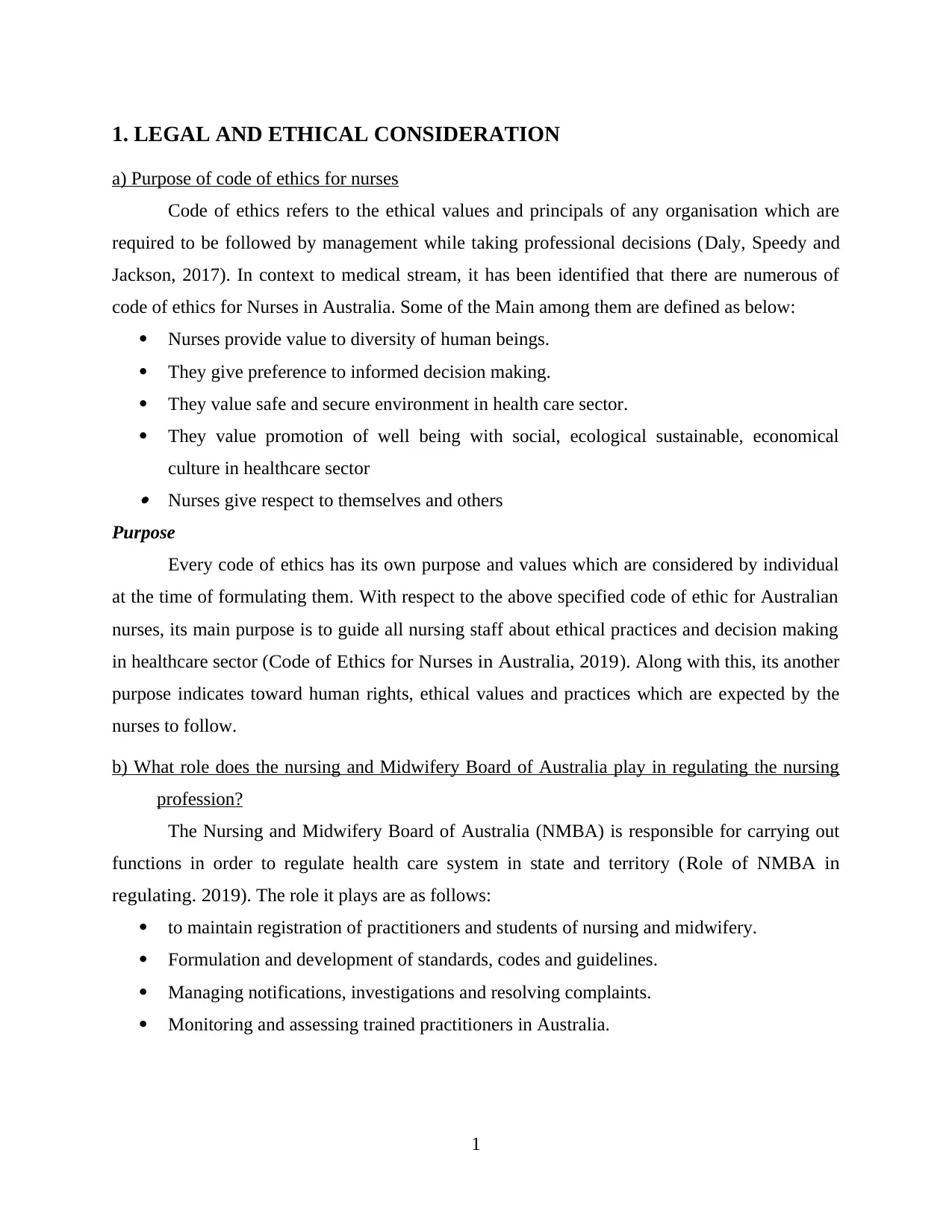
1. LEGAL AND ETHICAL CONSIDERATION
a) Purpose of code of ethics for nurses
Code of ethics refers to the ethical values and principals of any organisation which are
required to be followed by management while taking professional decisions (Daly, Speedy and
Jackson, 2017). In context to medical stream, it has been identified that there are numerous of
code of ethics for Nurses in Australia. Some of the Main among them are defined as below:
Nurses provide value to diversity of human beings.
They give preference to informed decision making.
They value safe and secure environment in health care sector.
They value promotion of well being with social, ecological sustainable, economical
culture in healthcare sector Nurses give respect to themselves and others
Purpose
Every code of ethics has its own purpose and values which are considered by individual
at the time of formulating them. With respect to the above specified code of ethic for Australian
nurses, its main purpose is to guide all nursing staff about ethical practices and decision making
in healthcare sector ( Code of Ethics for Nurses in Australia, 2019). Along with this, its another
purpose indicates toward human rights, ethical values and practices which are expected by the
nurses to follow.
b) What role does the nursing and Midwifery Board of Australia play in regulating the nursing
profession?
The Nursing and Midwifery Board of Australia (NMBA) is responsible for carrying out
functions in order to regulate health care system in state and territory ( Role of NMBA in
regulating. 2019). The role it plays are as follows:
to maintain registration of practitioners and students of nursing and midwifery.
Formulation and development of standards, codes and guidelines.
Managing notifications, investigations and resolving complaints.
Monitoring and assessing trained practitioners in Australia.
1
a) Purpose of code of ethics for nurses
Code of ethics refers to the ethical values and principals of any organisation which are
required to be followed by management while taking professional decisions (Daly, Speedy and
Jackson, 2017). In context to medical stream, it has been identified that there are numerous of
code of ethics for Nurses in Australia. Some of the Main among them are defined as below:
Nurses provide value to diversity of human beings.
They give preference to informed decision making.
They value safe and secure environment in health care sector.
They value promotion of well being with social, ecological sustainable, economical
culture in healthcare sector Nurses give respect to themselves and others
Purpose
Every code of ethics has its own purpose and values which are considered by individual
at the time of formulating them. With respect to the above specified code of ethic for Australian
nurses, its main purpose is to guide all nursing staff about ethical practices and decision making
in healthcare sector ( Code of Ethics for Nurses in Australia, 2019). Along with this, its another
purpose indicates toward human rights, ethical values and practices which are expected by the
nurses to follow.
b) What role does the nursing and Midwifery Board of Australia play in regulating the nursing
profession?
The Nursing and Midwifery Board of Australia (NMBA) is responsible for carrying out
functions in order to regulate health care system in state and territory ( Role of NMBA in
regulating. 2019). The role it plays are as follows:
to maintain registration of practitioners and students of nursing and midwifery.
Formulation and development of standards, codes and guidelines.
Managing notifications, investigations and resolving complaints.
Monitoring and assessing trained practitioners in Australia.
1
Secure Best Marks with AI Grader
Need help grading? Try our AI Grader for instant feedback on your assignments.
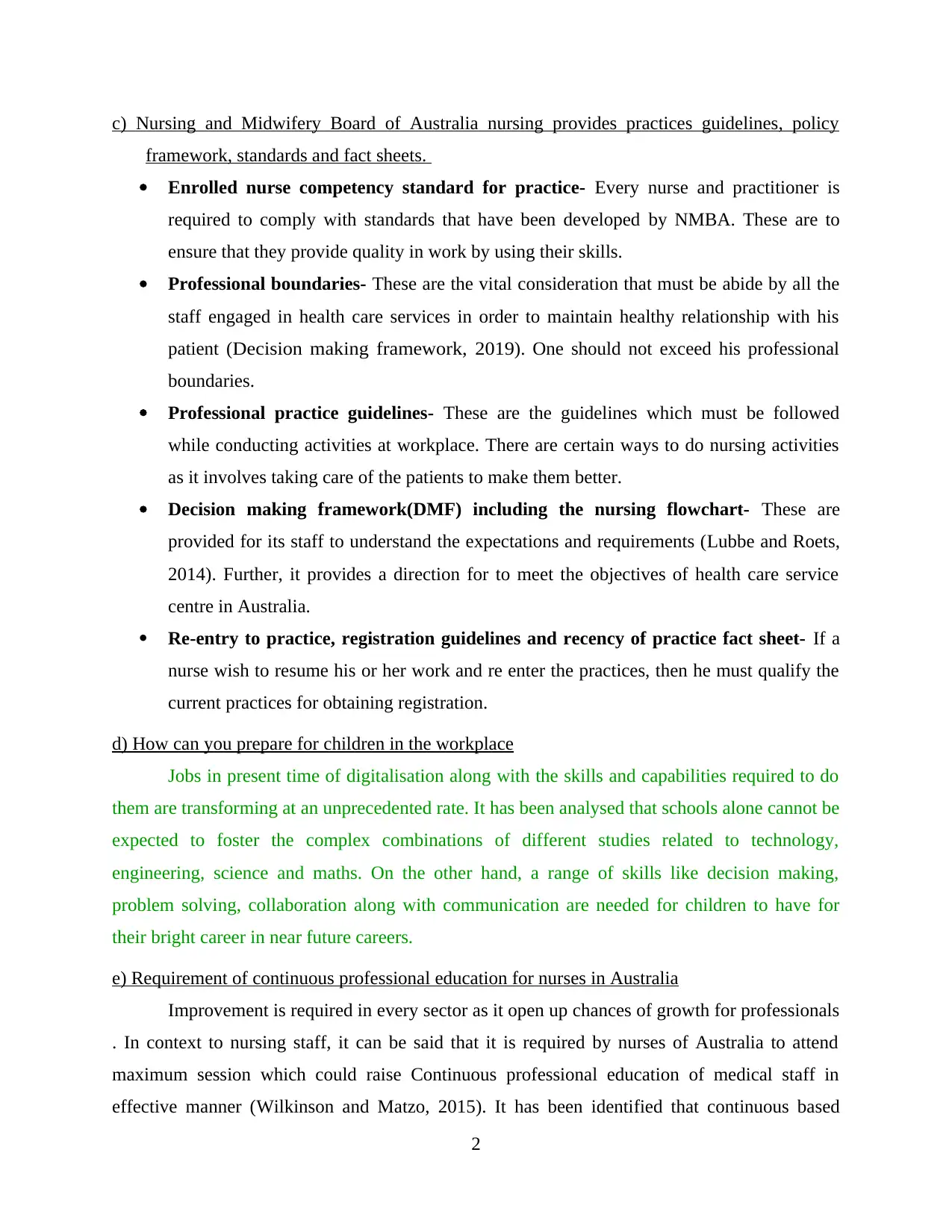
c) Nursing and Midwifery Board of Australia nursing provides practices guidelines, policy
framework, standards and fact sheets.
Enrolled nurse competency standard for practice- Every nurse and practitioner is
required to comply with standards that have been developed by NMBA. These are to
ensure that they provide quality in work by using their skills.
Professional boundaries- These are the vital consideration that must be abide by all the
staff engaged in health care services in order to maintain healthy relationship with his
patient ( Decision making framework, 2019). One should not exceed his professional
boundaries.
Professional practice guidelines- These are the guidelines which must be followed
while conducting activities at workplace. There are certain ways to do nursing activities
as it involves taking care of the patients to make them better.
Decision making framework(DMF) including the nursing flowchart- These are
provided for its staff to understand the expectations and requirements (Lubbe and Roets,
2014). Further, it provides a direction for to meet the objectives of health care service
centre in Australia.
Re-entry to practice, registration guidelines and recency of practice fact sheet- If a
nurse wish to resume his or her work and re enter the practices, then he must qualify the
current practices for obtaining registration.
d) How can you prepare for children in the workplace
Jobs in present time of digitalisation along with the skills and capabilities required to do
them are transforming at an unprecedented rate. It has been analysed that schools alone cannot be
expected to foster the complex combinations of different studies related to technology,
engineering, science and maths. On the other hand, a range of skills like decision making,
problem solving, collaboration along with communication are needed for children to have for
their bright career in near future careers.
e) Requirement of continuous professional education for nurses in Australia
Improvement is required in every sector as it open up chances of growth for professionals
. In context to nursing staff, it can be said that it is required by nurses of Australia to attend
maximum session which could raise Continuous professional education of medical staff in
effective manner (Wilkinson and Matzo, 2015). It has been identified that continuous based
2
framework, standards and fact sheets.
Enrolled nurse competency standard for practice- Every nurse and practitioner is
required to comply with standards that have been developed by NMBA. These are to
ensure that they provide quality in work by using their skills.
Professional boundaries- These are the vital consideration that must be abide by all the
staff engaged in health care services in order to maintain healthy relationship with his
patient ( Decision making framework, 2019). One should not exceed his professional
boundaries.
Professional practice guidelines- These are the guidelines which must be followed
while conducting activities at workplace. There are certain ways to do nursing activities
as it involves taking care of the patients to make them better.
Decision making framework(DMF) including the nursing flowchart- These are
provided for its staff to understand the expectations and requirements (Lubbe and Roets,
2014). Further, it provides a direction for to meet the objectives of health care service
centre in Australia.
Re-entry to practice, registration guidelines and recency of practice fact sheet- If a
nurse wish to resume his or her work and re enter the practices, then he must qualify the
current practices for obtaining registration.
d) How can you prepare for children in the workplace
Jobs in present time of digitalisation along with the skills and capabilities required to do
them are transforming at an unprecedented rate. It has been analysed that schools alone cannot be
expected to foster the complex combinations of different studies related to technology,
engineering, science and maths. On the other hand, a range of skills like decision making,
problem solving, collaboration along with communication are needed for children to have for
their bright career in near future careers.
e) Requirement of continuous professional education for nurses in Australia
Improvement is required in every sector as it open up chances of growth for professionals
. In context to nursing staff, it can be said that it is required by nurses of Australia to attend
maximum session which could raise Continuous professional education of medical staff in
effective manner (Wilkinson and Matzo, 2015). It has been identified that continuous based
2
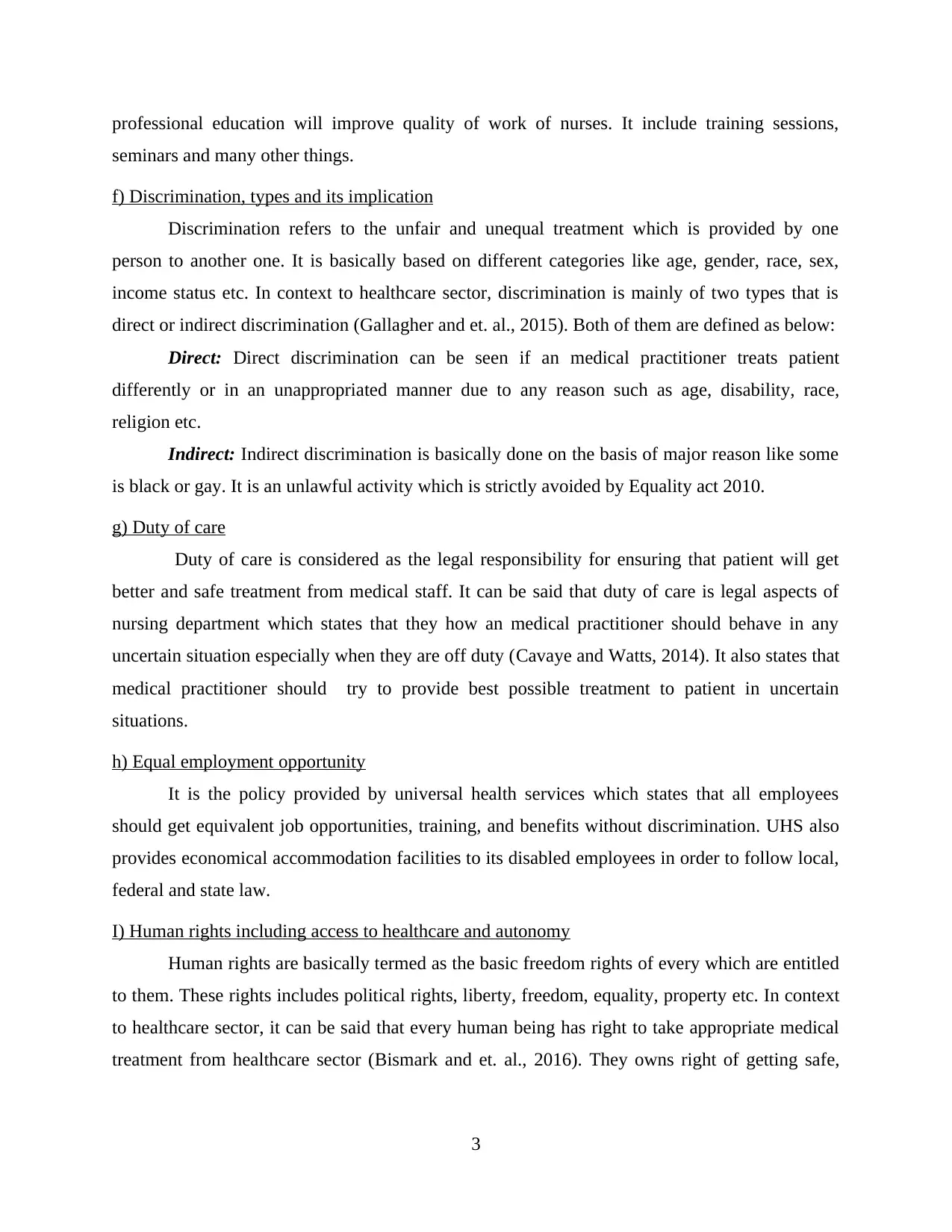
professional education will improve quality of work of nurses. It include training sessions,
seminars and many other things.
f) Discrimination, types and its implication
Discrimination refers to the unfair and unequal treatment which is provided by one
person to another one. It is basically based on different categories like age, gender, race, sex,
income status etc. In context to healthcare sector, discrimination is mainly of two types that is
direct or indirect discrimination (Gallagher and et. al., 2015). Both of them are defined as below:
Direct: Direct discrimination can be seen if an medical practitioner treats patient
differently or in an unappropriated manner due to any reason such as age, disability, race,
religion etc.
Indirect: Indirect discrimination is basically done on the basis of major reason like some
is black or gay. It is an unlawful activity which is strictly avoided by Equality act 2010.
g) Duty of care
Duty of care is considered as the legal responsibility for ensuring that patient will get
better and safe treatment from medical staff. It can be said that duty of care is legal aspects of
nursing department which states that they how an medical practitioner should behave in any
uncertain situation especially when they are off duty (Cavaye and Watts, 2014). It also states that
medical practitioner should try to provide best possible treatment to patient in uncertain
situations.
h) Equal employment opportunity
It is the policy provided by universal health services which states that all employees
should get equivalent job opportunities, training, and benefits without discrimination. UHS also
provides economical accommodation facilities to its disabled employees in order to follow local,
federal and state law.
I) Human rights including access to healthcare and autonomy
Human rights are basically termed as the basic freedom rights of every which are entitled
to them. These rights includes political rights, liberty, freedom, equality, property etc. In context
to healthcare sector, it can be said that every human being has right to take appropriate medical
treatment from healthcare sector (Bismark and et. al., 2016). They owns right of getting safe,
3
seminars and many other things.
f) Discrimination, types and its implication
Discrimination refers to the unfair and unequal treatment which is provided by one
person to another one. It is basically based on different categories like age, gender, race, sex,
income status etc. In context to healthcare sector, discrimination is mainly of two types that is
direct or indirect discrimination (Gallagher and et. al., 2015). Both of them are defined as below:
Direct: Direct discrimination can be seen if an medical practitioner treats patient
differently or in an unappropriated manner due to any reason such as age, disability, race,
religion etc.
Indirect: Indirect discrimination is basically done on the basis of major reason like some
is black or gay. It is an unlawful activity which is strictly avoided by Equality act 2010.
g) Duty of care
Duty of care is considered as the legal responsibility for ensuring that patient will get
better and safe treatment from medical staff. It can be said that duty of care is legal aspects of
nursing department which states that they how an medical practitioner should behave in any
uncertain situation especially when they are off duty (Cavaye and Watts, 2014). It also states that
medical practitioner should try to provide best possible treatment to patient in uncertain
situations.
h) Equal employment opportunity
It is the policy provided by universal health services which states that all employees
should get equivalent job opportunities, training, and benefits without discrimination. UHS also
provides economical accommodation facilities to its disabled employees in order to follow local,
federal and state law.
I) Human rights including access to healthcare and autonomy
Human rights are basically termed as the basic freedom rights of every which are entitled
to them. These rights includes political rights, liberty, freedom, equality, property etc. In context
to healthcare sector, it can be said that every human being has right to take appropriate medical
treatment from healthcare sector (Bismark and et. al., 2016). They owns right of getting safe,
3
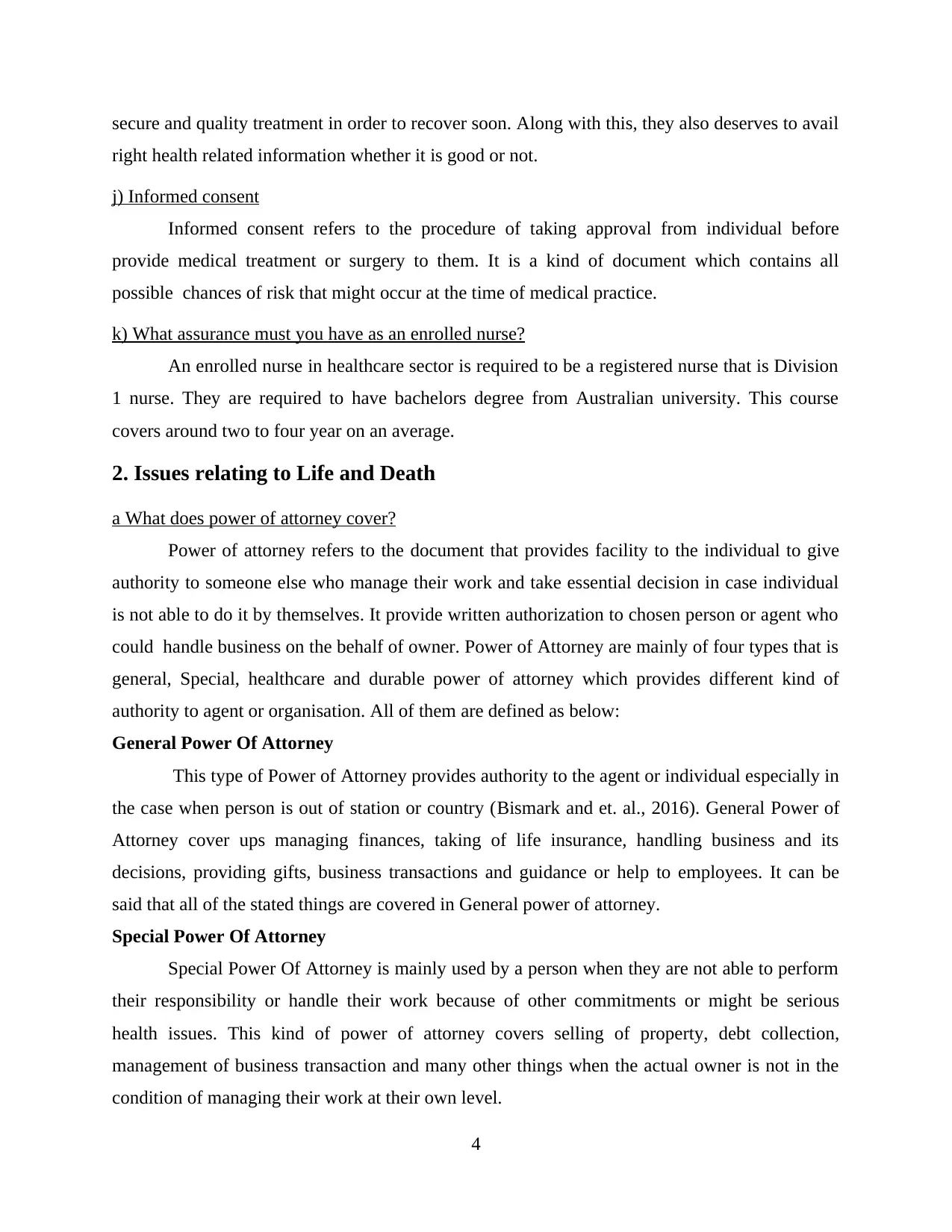
secure and quality treatment in order to recover soon. Along with this, they also deserves to avail
right health related information whether it is good or not.
j) Informed consent
Informed consent refers to the procedure of taking approval from individual before
provide medical treatment or surgery to them. It is a kind of document which contains all
possible chances of risk that might occur at the time of medical practice.
k) What assurance must you have as an enrolled nurse?
An enrolled nurse in healthcare sector is required to be a registered nurse that is Division
1 nurse. They are required to have bachelors degree from Australian university. This course
covers around two to four year on an average.
2. Issues relating to Life and Death
a What does power of attorney cover?
Power of attorney refers to the document that provides facility to the individual to give
authority to someone else who manage their work and take essential decision in case individual
is not able to do it by themselves. It provide written authorization to chosen person or agent who
could handle business on the behalf of owner. Power of Attorney are mainly of four types that is
general, Special, healthcare and durable power of attorney which provides different kind of
authority to agent or organisation. All of them are defined as below:
General Power Of Attorney
This type of Power of Attorney provides authority to the agent or individual especially in
the case when person is out of station or country (Bismark and et. al., 2016). General Power of
Attorney cover ups managing finances, taking of life insurance, handling business and its
decisions, providing gifts, business transactions and guidance or help to employees. It can be
said that all of the stated things are covered in General power of attorney.
Special Power Of Attorney
Special Power Of Attorney is mainly used by a person when they are not able to perform
their responsibility or handle their work because of other commitments or might be serious
health issues. This kind of power of attorney covers selling of property, debt collection,
management of business transaction and many other things when the actual owner is not in the
condition of managing their work at their own level.
4
right health related information whether it is good or not.
j) Informed consent
Informed consent refers to the procedure of taking approval from individual before
provide medical treatment or surgery to them. It is a kind of document which contains all
possible chances of risk that might occur at the time of medical practice.
k) What assurance must you have as an enrolled nurse?
An enrolled nurse in healthcare sector is required to be a registered nurse that is Division
1 nurse. They are required to have bachelors degree from Australian university. This course
covers around two to four year on an average.
2. Issues relating to Life and Death
a What does power of attorney cover?
Power of attorney refers to the document that provides facility to the individual to give
authority to someone else who manage their work and take essential decision in case individual
is not able to do it by themselves. It provide written authorization to chosen person or agent who
could handle business on the behalf of owner. Power of Attorney are mainly of four types that is
general, Special, healthcare and durable power of attorney which provides different kind of
authority to agent or organisation. All of them are defined as below:
General Power Of Attorney
This type of Power of Attorney provides authority to the agent or individual especially in
the case when person is out of station or country (Bismark and et. al., 2016). General Power of
Attorney cover ups managing finances, taking of life insurance, handling business and its
decisions, providing gifts, business transactions and guidance or help to employees. It can be
said that all of the stated things are covered in General power of attorney.
Special Power Of Attorney
Special Power Of Attorney is mainly used by a person when they are not able to perform
their responsibility or handle their work because of other commitments or might be serious
health issues. This kind of power of attorney covers selling of property, debt collection,
management of business transaction and many other things when the actual owner is not in the
condition of managing their work at their own level.
4
Paraphrase This Document
Need a fresh take? Get an instant paraphrase of this document with our AI Paraphraser
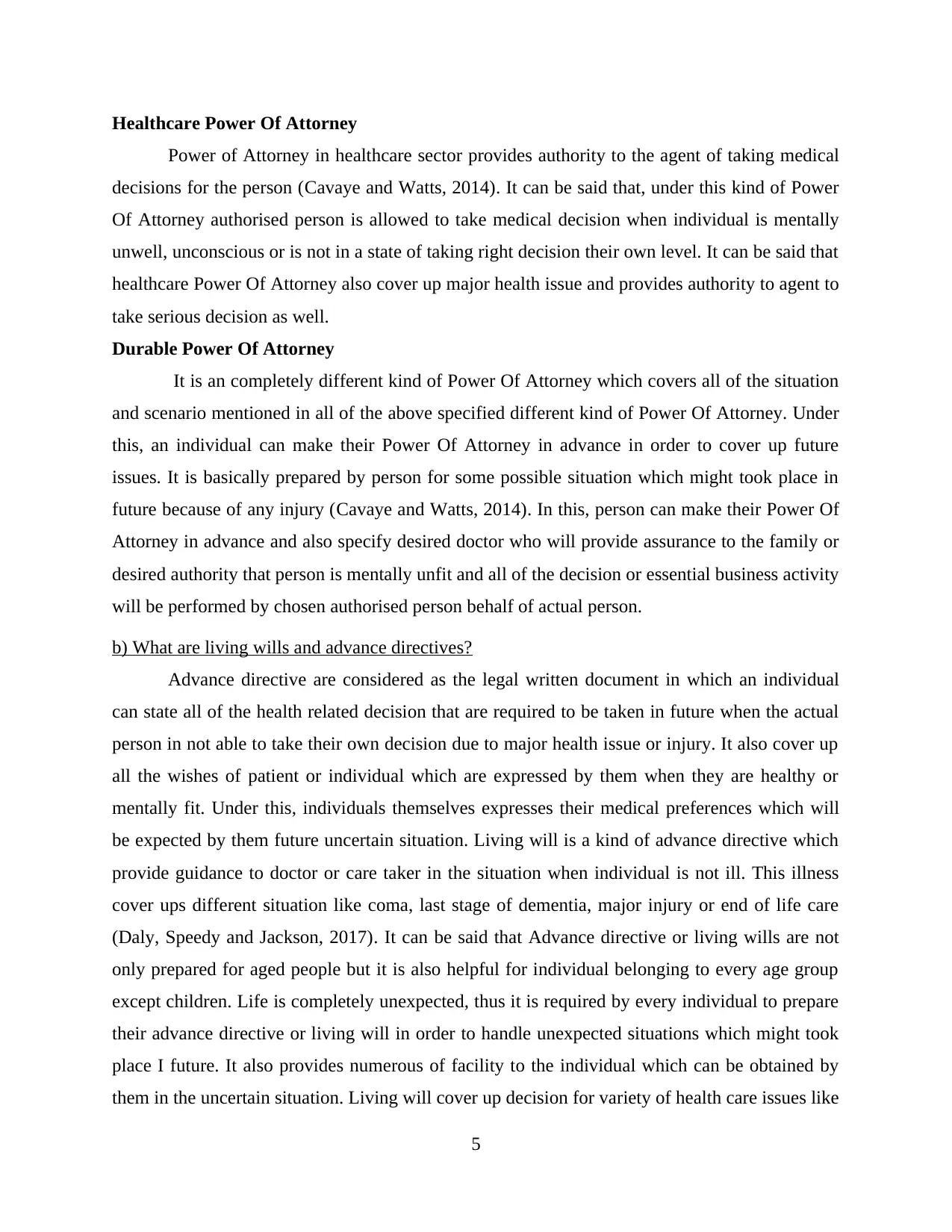
Healthcare Power Of Attorney
Power of Attorney in healthcare sector provides authority to the agent of taking medical
decisions for the person (Cavaye and Watts, 2014). It can be said that, under this kind of Power
Of Attorney authorised person is allowed to take medical decision when individual is mentally
unwell, unconscious or is not in a state of taking right decision their own level. It can be said that
healthcare Power Of Attorney also cover up major health issue and provides authority to agent to
take serious decision as well.
Durable Power Of Attorney
It is an completely different kind of Power Of Attorney which covers all of the situation
and scenario mentioned in all of the above specified different kind of Power Of Attorney. Under
this, an individual can make their Power Of Attorney in advance in order to cover up future
issues. It is basically prepared by person for some possible situation which might took place in
future because of any injury (Cavaye and Watts, 2014). In this, person can make their Power Of
Attorney in advance and also specify desired doctor who will provide assurance to the family or
desired authority that person is mentally unfit and all of the decision or essential business activity
will be performed by chosen authorised person behalf of actual person.
b) What are living wills and advance directives?
Advance directive are considered as the legal written document in which an individual
can state all of the health related decision that are required to be taken in future when the actual
person in not able to take their own decision due to major health issue or injury. It also cover up
all the wishes of patient or individual which are expressed by them when they are healthy or
mentally fit. Under this, individuals themselves expresses their medical preferences which will
be expected by them future uncertain situation. Living will is a kind of advance directive which
provide guidance to doctor or care taker in the situation when individual is not ill. This illness
cover ups different situation like coma, last stage of dementia, major injury or end of life care
(Daly, Speedy and Jackson, 2017). It can be said that Advance directive or living wills are not
only prepared for aged people but it is also helpful for individual belonging to every age group
except children. Life is completely unexpected, thus it is required by every individual to prepare
their advance directive or living will in order to handle unexpected situations which might took
place I future. It also provides numerous of facility to the individual which can be obtained by
them in the uncertain situation. Living will cover up decision for variety of health care issues like
5
Power of Attorney in healthcare sector provides authority to the agent of taking medical
decisions for the person (Cavaye and Watts, 2014). It can be said that, under this kind of Power
Of Attorney authorised person is allowed to take medical decision when individual is mentally
unwell, unconscious or is not in a state of taking right decision their own level. It can be said that
healthcare Power Of Attorney also cover up major health issue and provides authority to agent to
take serious decision as well.
Durable Power Of Attorney
It is an completely different kind of Power Of Attorney which covers all of the situation
and scenario mentioned in all of the above specified different kind of Power Of Attorney. Under
this, an individual can make their Power Of Attorney in advance in order to cover up future
issues. It is basically prepared by person for some possible situation which might took place in
future because of any injury (Cavaye and Watts, 2014). In this, person can make their Power Of
Attorney in advance and also specify desired doctor who will provide assurance to the family or
desired authority that person is mentally unfit and all of the decision or essential business activity
will be performed by chosen authorised person behalf of actual person.
b) What are living wills and advance directives?
Advance directive are considered as the legal written document in which an individual
can state all of the health related decision that are required to be taken in future when the actual
person in not able to take their own decision due to major health issue or injury. It also cover up
all the wishes of patient or individual which are expressed by them when they are healthy or
mentally fit. Under this, individuals themselves expresses their medical preferences which will
be expected by them future uncertain situation. Living will is a kind of advance directive which
provide guidance to doctor or care taker in the situation when individual is not ill. This illness
cover ups different situation like coma, last stage of dementia, major injury or end of life care
(Daly, Speedy and Jackson, 2017). It can be said that Advance directive or living wills are not
only prepared for aged people but it is also helpful for individual belonging to every age group
except children. Life is completely unexpected, thus it is required by every individual to prepare
their advance directive or living will in order to handle unexpected situations which might took
place I future. It also provides numerous of facility to the individual which can be obtained by
them in the uncertain situation. Living will cover up decision for variety of health care issues like
5
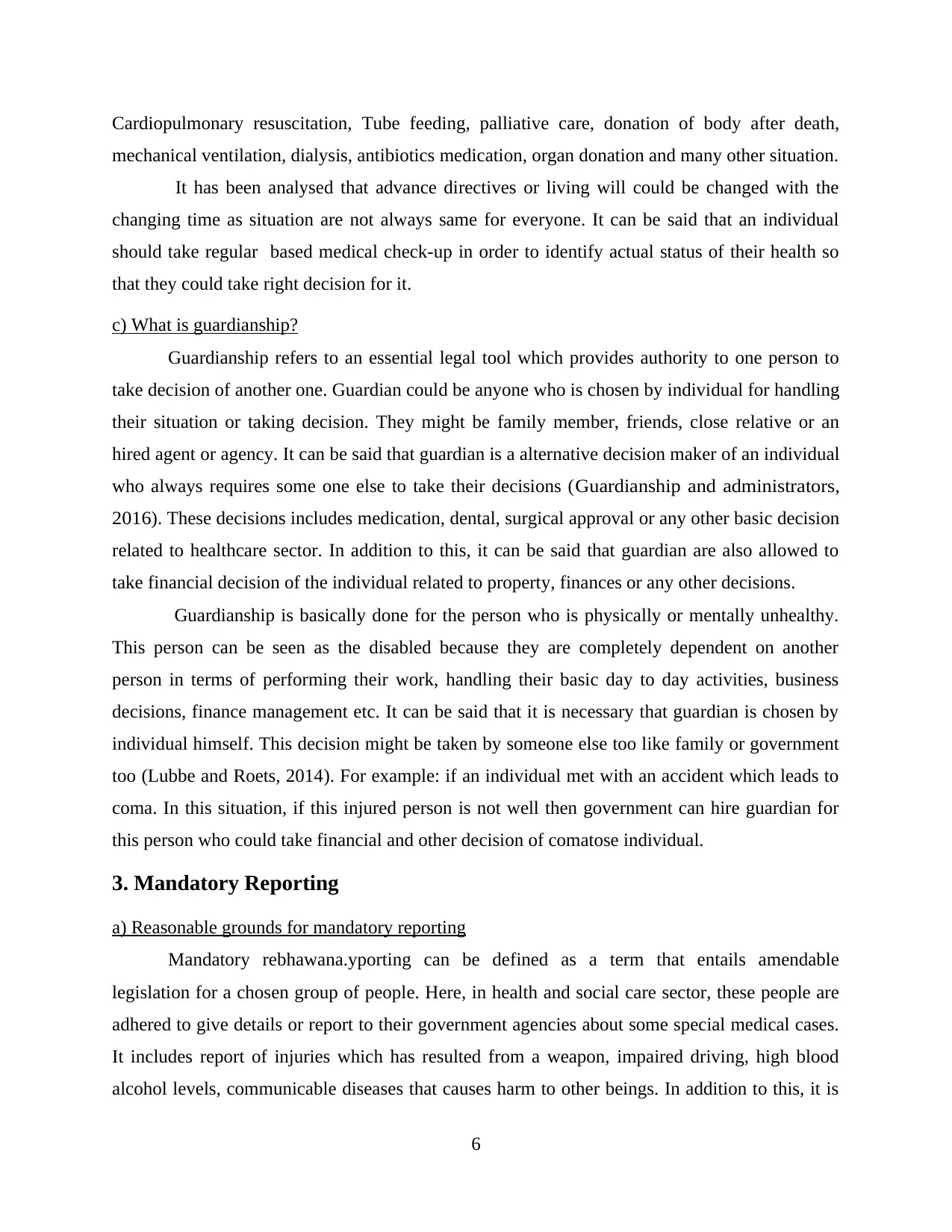
Cardiopulmonary resuscitation, Tube feeding, palliative care, donation of body after death,
mechanical ventilation, dialysis, antibiotics medication, organ donation and many other situation.
It has been analysed that advance directives or living will could be changed with the
changing time as situation are not always same for everyone. It can be said that an individual
should take regular based medical check-up in order to identify actual status of their health so
that they could take right decision for it.
c) What is guardianship?
Guardianship refers to an essential legal tool which provides authority to one person to
take decision of another one. Guardian could be anyone who is chosen by individual for handling
their situation or taking decision. They might be family member, friends, close relative or an
hired agent or agency. It can be said that guardian is a alternative decision maker of an individual
who always requires some one else to take their decisions ( Guardianship and administrators,
2016). These decisions includes medication, dental, surgical approval or any other basic decision
related to healthcare sector. In addition to this, it can be said that guardian are also allowed to
take financial decision of the individual related to property, finances or any other decisions.
Guardianship is basically done for the person who is physically or mentally unhealthy.
This person can be seen as the disabled because they are completely dependent on another
person in terms of performing their work, handling their basic day to day activities, business
decisions, finance management etc. It can be said that it is necessary that guardian is chosen by
individual himself. This decision might be taken by someone else too like family or government
too (Lubbe and Roets, 2014). For example: if an individual met with an accident which leads to
coma. In this situation, if this injured person is not well then government can hire guardian for
this person who could take financial and other decision of comatose individual.
3. Mandatory Reporting
a) Reasonable grounds for mandatory reporting
Mandatory rebhawana.yporting can be defined as a term that entails amendable
legislation for a chosen group of people. Here, in health and social care sector, these people are
adhered to give details or report to their government agencies about some special medical cases.
It includes report of injuries which has resulted from a weapon, impaired driving, high blood
alcohol levels, communicable diseases that causes harm to other beings. In addition to this, it is
6
mechanical ventilation, dialysis, antibiotics medication, organ donation and many other situation.
It has been analysed that advance directives or living will could be changed with the
changing time as situation are not always same for everyone. It can be said that an individual
should take regular based medical check-up in order to identify actual status of their health so
that they could take right decision for it.
c) What is guardianship?
Guardianship refers to an essential legal tool which provides authority to one person to
take decision of another one. Guardian could be anyone who is chosen by individual for handling
their situation or taking decision. They might be family member, friends, close relative or an
hired agent or agency. It can be said that guardian is a alternative decision maker of an individual
who always requires some one else to take their decisions ( Guardianship and administrators,
2016). These decisions includes medication, dental, surgical approval or any other basic decision
related to healthcare sector. In addition to this, it can be said that guardian are also allowed to
take financial decision of the individual related to property, finances or any other decisions.
Guardianship is basically done for the person who is physically or mentally unhealthy.
This person can be seen as the disabled because they are completely dependent on another
person in terms of performing their work, handling their basic day to day activities, business
decisions, finance management etc. It can be said that it is necessary that guardian is chosen by
individual himself. This decision might be taken by someone else too like family or government
too (Lubbe and Roets, 2014). For example: if an individual met with an accident which leads to
coma. In this situation, if this injured person is not well then government can hire guardian for
this person who could take financial and other decision of comatose individual.
3. Mandatory Reporting
a) Reasonable grounds for mandatory reporting
Mandatory rebhawana.yporting can be defined as a term that entails amendable
legislation for a chosen group of people. Here, in health and social care sector, these people are
adhered to give details or report to their government agencies about some special medical cases.
It includes report of injuries which has resulted from a weapon, impaired driving, high blood
alcohol levels, communicable diseases that causes harm to other beings. In addition to this, it is
6
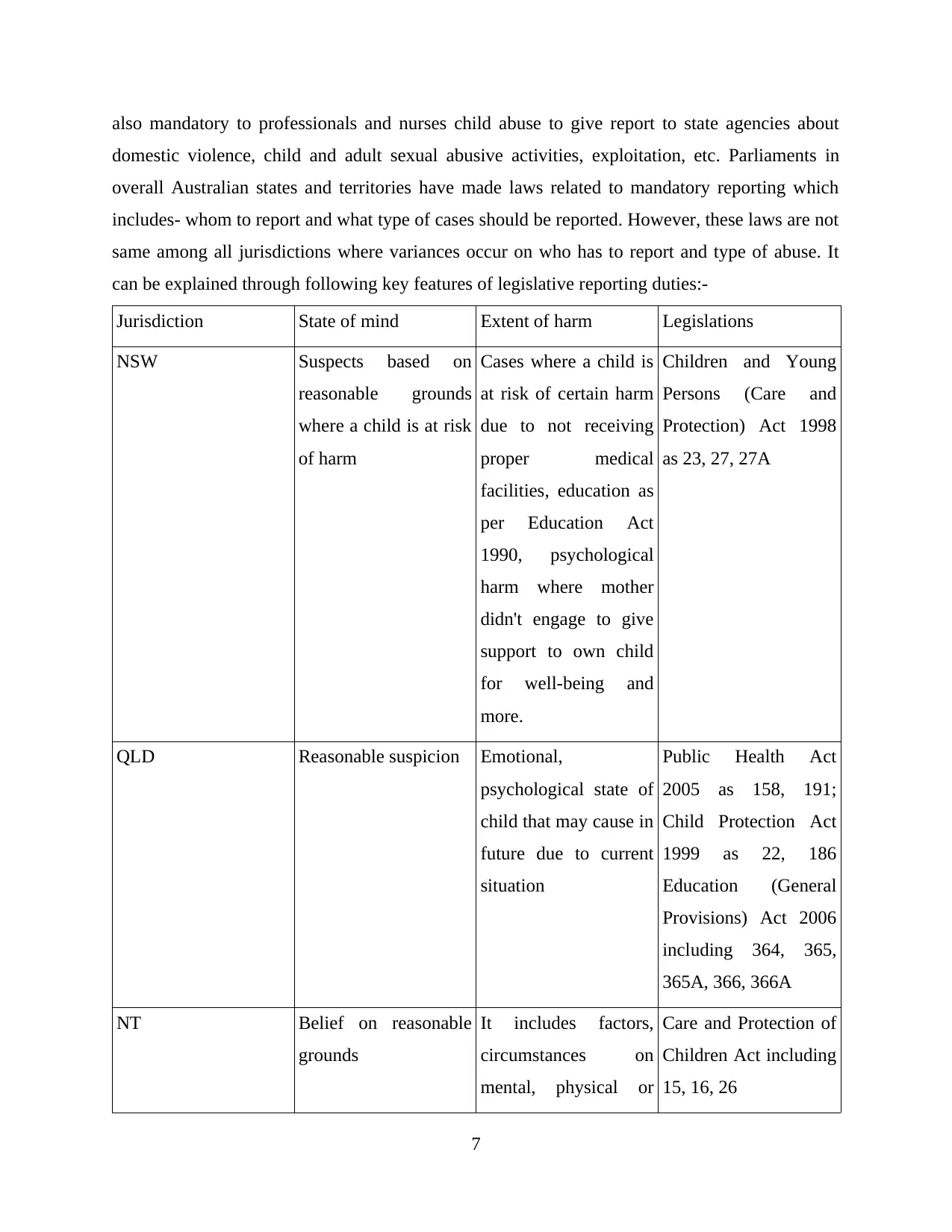
also mandatory to professionals and nurses child abuse to give report to state agencies about
domestic violence, child and adult sexual abusive activities, exploitation, etc. Parliaments in
overall Australian states and territories have made laws related to mandatory reporting which
includes- whom to report and what type of cases should be reported. However, these laws are not
same among all jurisdictions where variances occur on who has to report and type of abuse. It
can be explained through following key features of legislative reporting duties:-
Jurisdiction State of mind Extent of harm Legislations
NSW Suspects based on
reasonable grounds
where a child is at risk
of harm
Cases where a child is
at risk of certain harm
due to not receiving
proper medical
facilities, education as
per Education Act
1990, psychological
harm where mother
didn't engage to give
support to own child
for well-being and
more.
Children and Young
Persons (Care and
Protection) Act 1998
as 23, 27, 27A
QLD Reasonable suspicion Emotional,
psychological state of
child that may cause in
future due to current
situation
Public Health Act
2005 as 158, 191;
Child Protection Act
1999 as 22, 186
Education (General
Provisions) Act 2006
including 364, 365,
365A, 366, 366A
NT Belief on reasonable
grounds
It includes factors,
circumstances on
mental, physical or
Care and Protection of
Children Act including
15, 16, 26
7
domestic violence, child and adult sexual abusive activities, exploitation, etc. Parliaments in
overall Australian states and territories have made laws related to mandatory reporting which
includes- whom to report and what type of cases should be reported. However, these laws are not
same among all jurisdictions where variances occur on who has to report and type of abuse. It
can be explained through following key features of legislative reporting duties:-
Jurisdiction State of mind Extent of harm Legislations
NSW Suspects based on
reasonable grounds
where a child is at risk
of harm
Cases where a child is
at risk of certain harm
due to not receiving
proper medical
facilities, education as
per Education Act
1990, psychological
harm where mother
didn't engage to give
support to own child
for well-being and
more.
Children and Young
Persons (Care and
Protection) Act 1998
as 23, 27, 27A
QLD Reasonable suspicion Emotional,
psychological state of
child that may cause in
future due to current
situation
Public Health Act
2005 as 158, 191;
Child Protection Act
1999 as 22, 186
Education (General
Provisions) Act 2006
including 364, 365,
365A, 366, 366A
NT Belief on reasonable
grounds
It includes factors,
circumstances on
mental, physical or
Care and Protection of
Children Act including
15, 16, 26
7
Secure Best Marks with AI Grader
Need help grading? Try our AI Grader for instant feedback on your assignments.
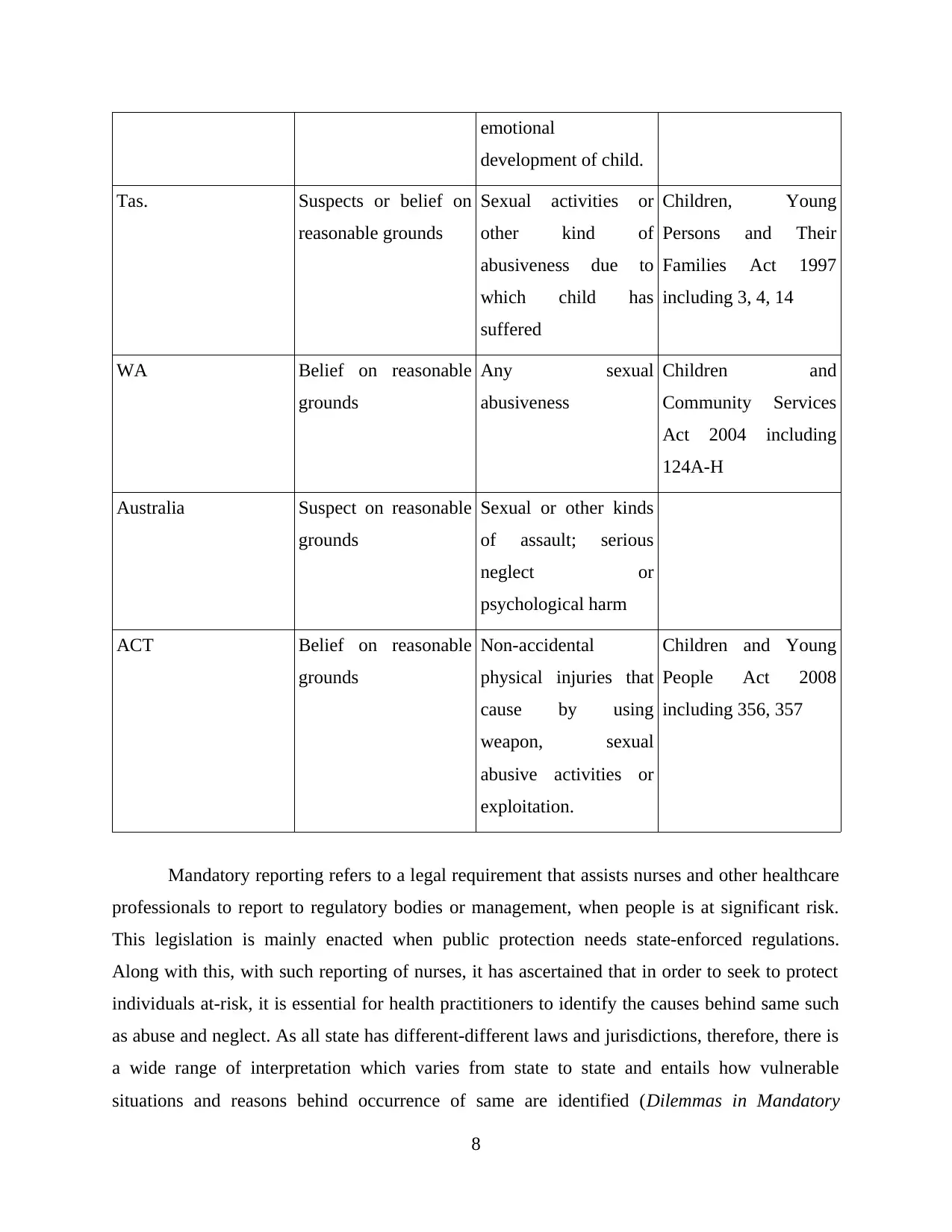
emotional
development of child.
Tas. Suspects or belief on
reasonable grounds
Sexual activities or
other kind of
abusiveness due to
which child has
suffered
Children, Young
Persons and Their
Families Act 1997
including 3, 4, 14
WA Belief on reasonable
grounds
Any sexual
abusiveness
Children and
Community Services
Act 2004 including
124A-H
Australia Suspect on reasonable
grounds
Sexual or other kinds
of assault; serious
neglect or
psychological harm
ACT Belief on reasonable
grounds
Non-accidental
physical injuries that
cause by using
weapon, sexual
abusive activities or
exploitation.
Children and Young
People Act 2008
including 356, 357
Mandatory reporting refers to a legal requirement that assists nurses and other healthcare
professionals to report to regulatory bodies or management, when people is at significant risk.
This legislation is mainly enacted when public protection needs state-enforced regulations.
Along with this, with such reporting of nurses, it has ascertained that in order to seek to protect
individuals at-risk, it is essential for health practitioners to identify the causes behind same such
as abuse and neglect. As all state has different-different laws and jurisdictions, therefore, there is
a wide range of interpretation which varies from state to state and entails how vulnerable
situations and reasons behind occurrence of same are identified (Dilemmas in Mandatory
8
development of child.
Tas. Suspects or belief on
reasonable grounds
Sexual activities or
other kind of
abusiveness due to
which child has
suffered
Children, Young
Persons and Their
Families Act 1997
including 3, 4, 14
WA Belief on reasonable
grounds
Any sexual
abusiveness
Children and
Community Services
Act 2004 including
124A-H
Australia Suspect on reasonable
grounds
Sexual or other kinds
of assault; serious
neglect or
psychological harm
ACT Belief on reasonable
grounds
Non-accidental
physical injuries that
cause by using
weapon, sexual
abusive activities or
exploitation.
Children and Young
People Act 2008
including 356, 357
Mandatory reporting refers to a legal requirement that assists nurses and other healthcare
professionals to report to regulatory bodies or management, when people is at significant risk.
This legislation is mainly enacted when public protection needs state-enforced regulations.
Along with this, with such reporting of nurses, it has ascertained that in order to seek to protect
individuals at-risk, it is essential for health practitioners to identify the causes behind same such
as abuse and neglect. As all state has different-different laws and jurisdictions, therefore, there is
a wide range of interpretation which varies from state to state and entails how vulnerable
situations and reasons behind occurrence of same are identified (Dilemmas in Mandatory
8
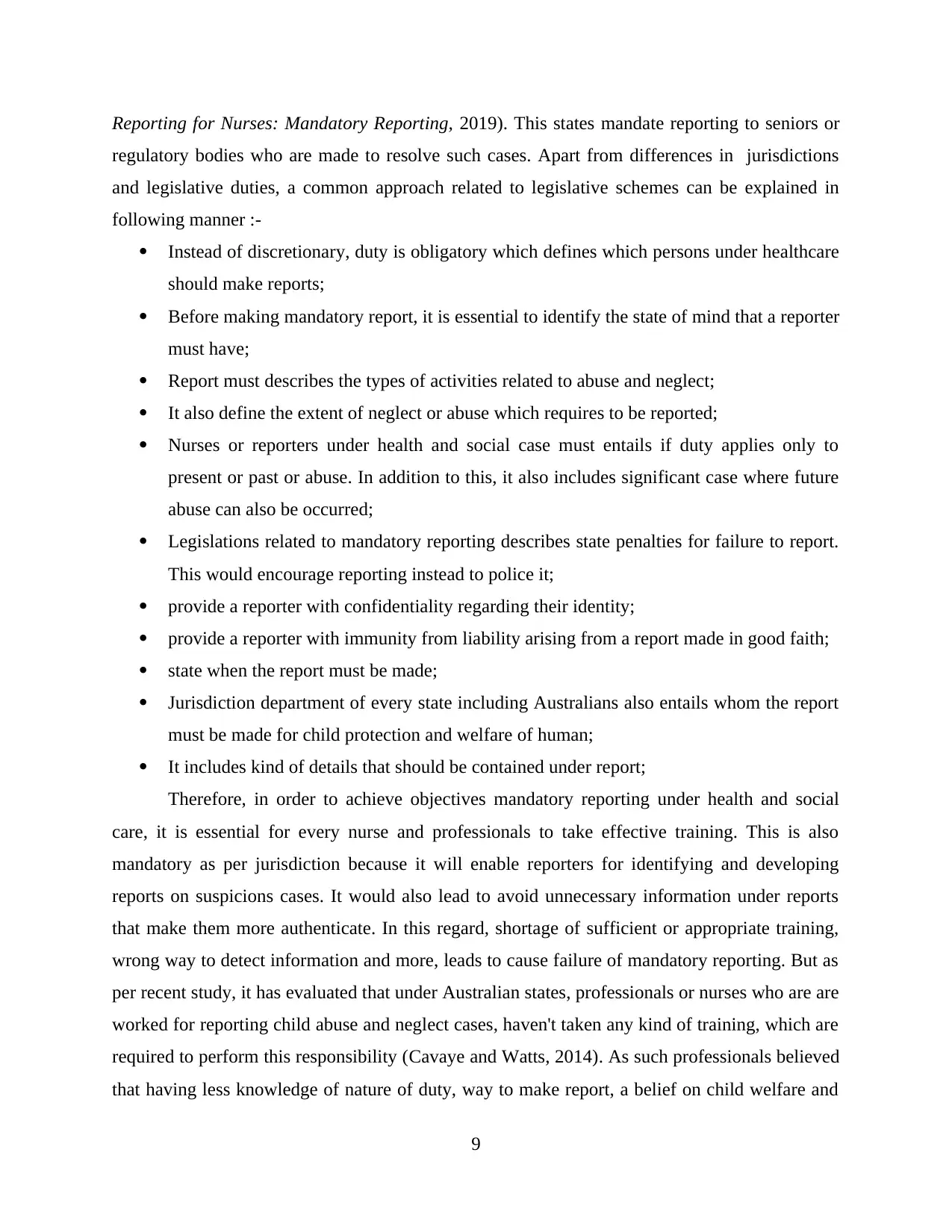
Reporting for Nurses: Mandatory Reporting, 2019). This states mandate reporting to seniors or
regulatory bodies who are made to resolve such cases. Apart from differences in jurisdictions
and legislative duties, a common approach related to legislative schemes can be explained in
following manner :-
Instead of discretionary, duty is obligatory which defines which persons under healthcare
should make reports;
Before making mandatory report, it is essential to identify the state of mind that a reporter
must have;
Report must describes the types of activities related to abuse and neglect;
It also define the extent of neglect or abuse which requires to be reported;
Nurses or reporters under health and social case must entails if duty applies only to
present or past or abuse. In addition to this, it also includes significant case where future
abuse can also be occurred;
Legislations related to mandatory reporting describes state penalties for failure to report.
This would encourage reporting instead to police it;
provide a reporter with confidentiality regarding their identity;
provide a reporter with immunity from liability arising from a report made in good faith;
state when the report must be made;
Jurisdiction department of every state including Australians also entails whom the report
must be made for child protection and welfare of human;
It includes kind of details that should be contained under report;
Therefore, in order to achieve objectives mandatory reporting under health and social
care, it is essential for every nurse and professionals to take effective training. This is also
mandatory as per jurisdiction because it will enable reporters for identifying and developing
reports on suspicions cases. It would also lead to avoid unnecessary information under reports
that make them more authenticate. In this regard, shortage of sufficient or appropriate training,
wrong way to detect information and more, leads to cause failure of mandatory reporting. But as
per recent study, it has evaluated that under Australian states, professionals or nurses who are are
worked for reporting child abuse and neglect cases, haven't taken any kind of training, which are
required to perform this responsibility (Cavaye and Watts, 2014). As such professionals believed
that having less knowledge of nature of duty, way to make report, a belief on child welfare and
9
regulatory bodies who are made to resolve such cases. Apart from differences in jurisdictions
and legislative duties, a common approach related to legislative schemes can be explained in
following manner :-
Instead of discretionary, duty is obligatory which defines which persons under healthcare
should make reports;
Before making mandatory report, it is essential to identify the state of mind that a reporter
must have;
Report must describes the types of activities related to abuse and neglect;
It also define the extent of neglect or abuse which requires to be reported;
Nurses or reporters under health and social case must entails if duty applies only to
present or past or abuse. In addition to this, it also includes significant case where future
abuse can also be occurred;
Legislations related to mandatory reporting describes state penalties for failure to report.
This would encourage reporting instead to police it;
provide a reporter with confidentiality regarding their identity;
provide a reporter with immunity from liability arising from a report made in good faith;
state when the report must be made;
Jurisdiction department of every state including Australians also entails whom the report
must be made for child protection and welfare of human;
It includes kind of details that should be contained under report;
Therefore, in order to achieve objectives mandatory reporting under health and social
care, it is essential for every nurse and professionals to take effective training. This is also
mandatory as per jurisdiction because it will enable reporters for identifying and developing
reports on suspicions cases. It would also lead to avoid unnecessary information under reports
that make them more authenticate. In this regard, shortage of sufficient or appropriate training,
wrong way to detect information and more, leads to cause failure of mandatory reporting. But as
per recent study, it has evaluated that under Australian states, professionals or nurses who are are
worked for reporting child abuse and neglect cases, haven't taken any kind of training, which are
required to perform this responsibility (Cavaye and Watts, 2014). As such professionals believed
that having less knowledge of nature of duty, way to make report, a belief on child welfare and
9
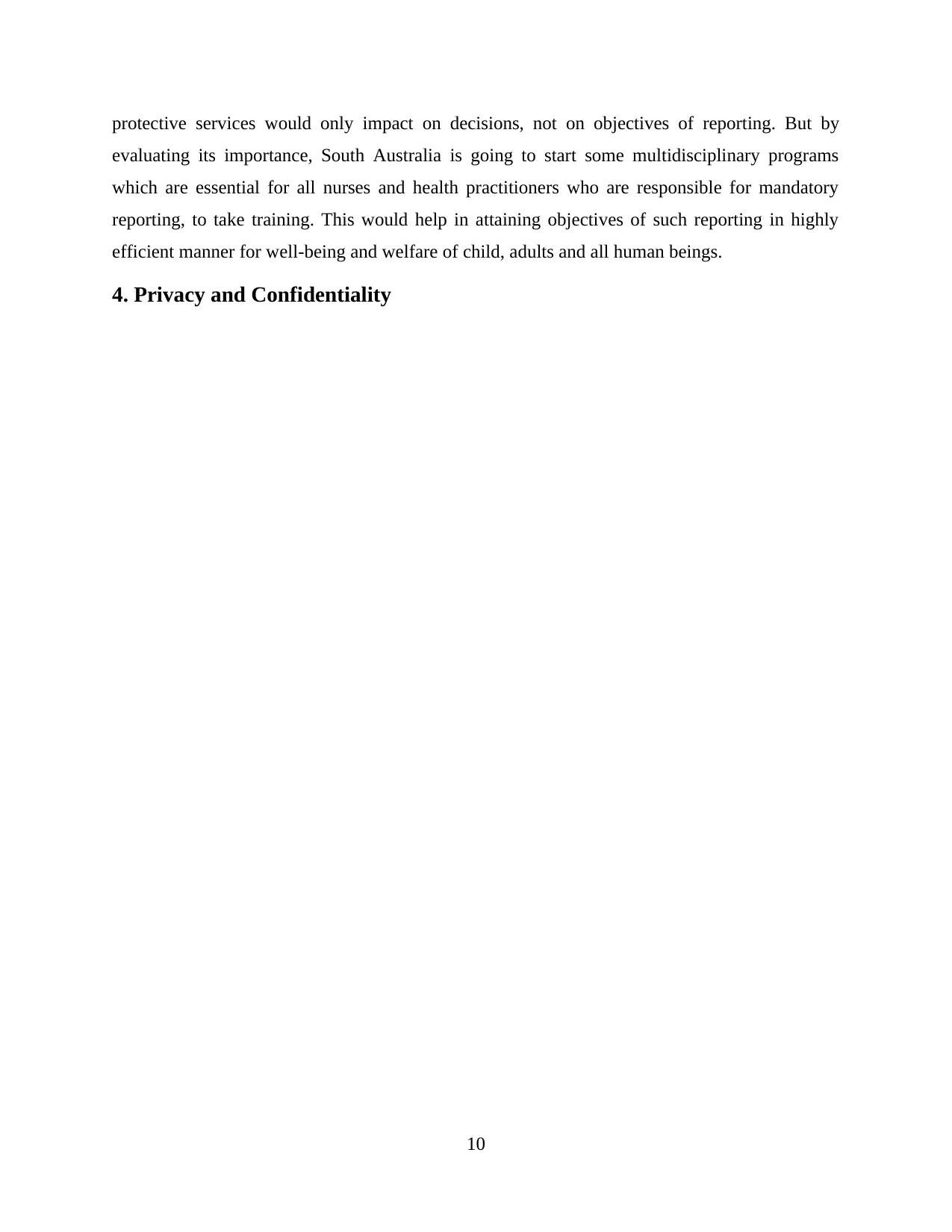
protective services would only impact on decisions, not on objectives of reporting. But by
evaluating its importance, South Australia is going to start some multidisciplinary programs
which are essential for all nurses and health practitioners who are responsible for mandatory
reporting, to take training. This would help in attaining objectives of such reporting in highly
efficient manner for well-being and welfare of child, adults and all human beings.
4. Privacy and Confidentiality
10
evaluating its importance, South Australia is going to start some multidisciplinary programs
which are essential for all nurses and health practitioners who are responsible for mandatory
reporting, to take training. This would help in attaining objectives of such reporting in highly
efficient manner for well-being and welfare of child, adults and all human beings.
4. Privacy and Confidentiality
10
Paraphrase This Document
Need a fresh take? Get an instant paraphrase of this document with our AI Paraphraser
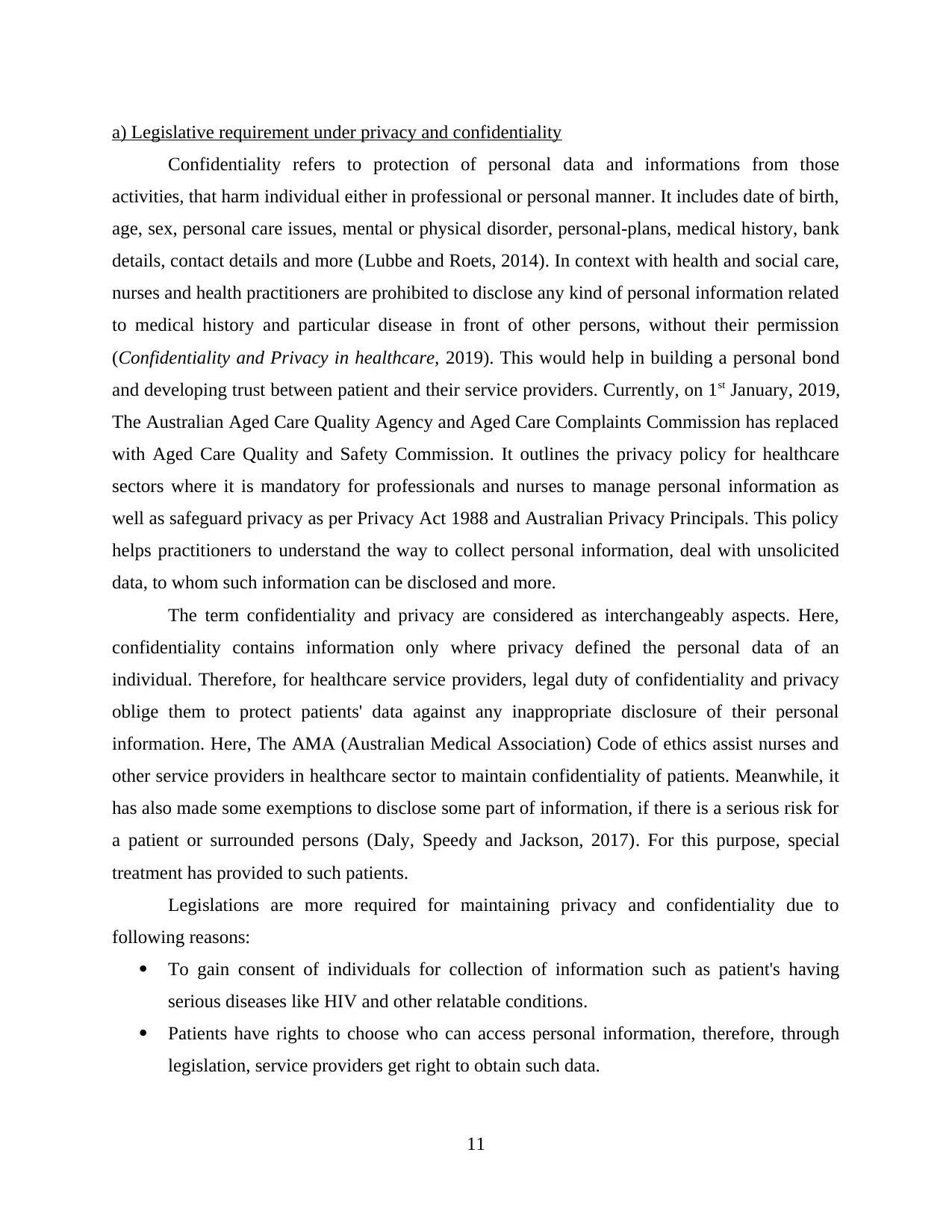
a) Legislative requirement under privacy and confidentiality
Confidentiality refers to protection of personal data and informations from those
activities, that harm individual either in professional or personal manner. It includes date of birth,
age, sex, personal care issues, mental or physical disorder, personal-plans, medical history, bank
details, contact details and more (Lubbe and Roets, 2014). In context with health and social care,
nurses and health practitioners are prohibited to disclose any kind of personal information related
to medical history and particular disease in front of other persons, without their permission
(Confidentiality and Privacy in healthcare, 2019). This would help in building a personal bond
and developing trust between patient and their service providers. Currently, on 1st January, 2019,
The Australian Aged Care Quality Agency and Aged Care Complaints Commission has replaced
with Aged Care Quality and Safety Commission. It outlines the privacy policy for healthcare
sectors where it is mandatory for professionals and nurses to manage personal information as
well as safeguard privacy as per Privacy Act 1988 and Australian Privacy Principals. This policy
helps practitioners to understand the way to collect personal information, deal with unsolicited
data, to whom such information can be disclosed and more.
The term confidentiality and privacy are considered as interchangeably aspects. Here,
confidentiality contains information only where privacy defined the personal data of an
individual. Therefore, for healthcare service providers, legal duty of confidentiality and privacy
oblige them to protect patients' data against any inappropriate disclosure of their personal
information. Here, The AMA (Australian Medical Association) Code of ethics assist nurses and
other service providers in healthcare sector to maintain confidentiality of patients. Meanwhile, it
has also made some exemptions to disclose some part of information, if there is a serious risk for
a patient or surrounded persons (Daly, Speedy and Jackson, 2017). For this purpose, special
treatment has provided to such patients.
Legislations are more required for maintaining privacy and confidentiality due to
following reasons:
To gain consent of individuals for collection of information such as patient's having
serious diseases like HIV and other relatable conditions.
Patients have rights to choose who can access personal information, therefore, through
legislation, service providers get right to obtain such data.
11
Confidentiality refers to protection of personal data and informations from those
activities, that harm individual either in professional or personal manner. It includes date of birth,
age, sex, personal care issues, mental or physical disorder, personal-plans, medical history, bank
details, contact details and more (Lubbe and Roets, 2014). In context with health and social care,
nurses and health practitioners are prohibited to disclose any kind of personal information related
to medical history and particular disease in front of other persons, without their permission
(Confidentiality and Privacy in healthcare, 2019). This would help in building a personal bond
and developing trust between patient and their service providers. Currently, on 1st January, 2019,
The Australian Aged Care Quality Agency and Aged Care Complaints Commission has replaced
with Aged Care Quality and Safety Commission. It outlines the privacy policy for healthcare
sectors where it is mandatory for professionals and nurses to manage personal information as
well as safeguard privacy as per Privacy Act 1988 and Australian Privacy Principals. This policy
helps practitioners to understand the way to collect personal information, deal with unsolicited
data, to whom such information can be disclosed and more.
The term confidentiality and privacy are considered as interchangeably aspects. Here,
confidentiality contains information only where privacy defined the personal data of an
individual. Therefore, for healthcare service providers, legal duty of confidentiality and privacy
oblige them to protect patients' data against any inappropriate disclosure of their personal
information. Here, The AMA (Australian Medical Association) Code of ethics assist nurses and
other service providers in healthcare sector to maintain confidentiality of patients. Meanwhile, it
has also made some exemptions to disclose some part of information, if there is a serious risk for
a patient or surrounded persons (Daly, Speedy and Jackson, 2017). For this purpose, special
treatment has provided to such patients.
Legislations are more required for maintaining privacy and confidentiality due to
following reasons:
To gain consent of individuals for collection of information such as patient's having
serious diseases like HIV and other relatable conditions.
Patients have rights to choose who can access personal information, therefore, through
legislation, service providers get right to obtain such data.
11
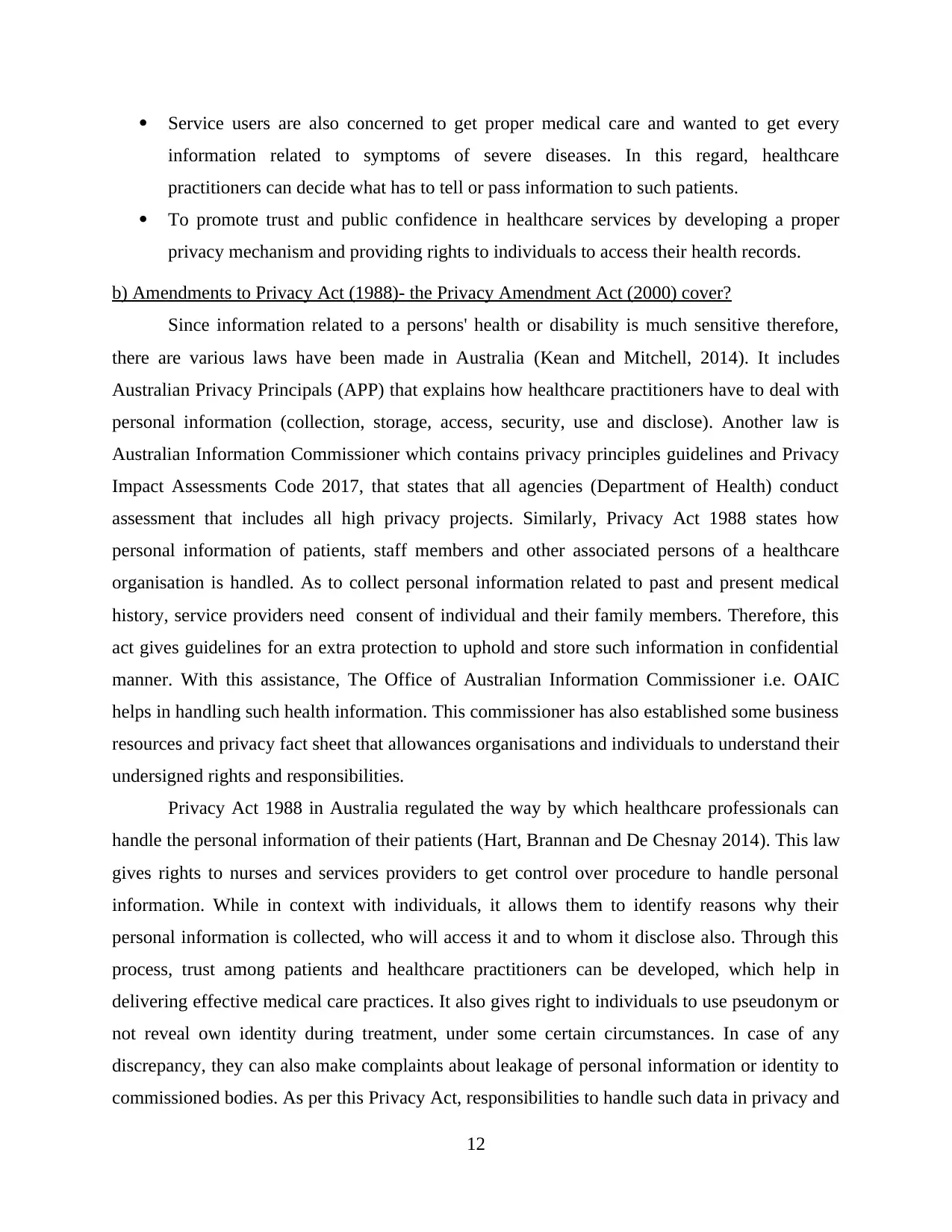
Service users are also concerned to get proper medical care and wanted to get every
information related to symptoms of severe diseases. In this regard, healthcare
practitioners can decide what has to tell or pass information to such patients.
To promote trust and public confidence in healthcare services by developing a proper
privacy mechanism and providing rights to individuals to access their health records.
b) Amendments to Privacy Act (1988)- the Privacy Amendment Act (2000) cover?
Since information related to a persons' health or disability is much sensitive therefore,
there are various laws have been made in Australia (Kean and Mitchell, 2014). It includes
Australian Privacy Principals (APP) that explains how healthcare practitioners have to deal with
personal information (collection, storage, access, security, use and disclose). Another law is
Australian Information Commissioner which contains privacy principles guidelines and Privacy
Impact Assessments Code 2017, that states that all agencies (Department of Health) conduct
assessment that includes all high privacy projects. Similarly, Privacy Act 1988 states how
personal information of patients, staff members and other associated persons of a healthcare
organisation is handled. As to collect personal information related to past and present medical
history, service providers need consent of individual and their family members. Therefore, this
act gives guidelines for an extra protection to uphold and store such information in confidential
manner. With this assistance, The Office of Australian Information Commissioner i.e. OAIC
helps in handling such health information. This commissioner has also established some business
resources and privacy fact sheet that allowances organisations and individuals to understand their
undersigned rights and responsibilities.
Privacy Act 1988 in Australia regulated the way by which healthcare professionals can
handle the personal information of their patients (Hart, Brannan and De Chesnay 2014). This law
gives rights to nurses and services providers to get control over procedure to handle personal
information. While in context with individuals, it allows them to identify reasons why their
personal information is collected, who will access it and to whom it disclose also. Through this
process, trust among patients and healthcare practitioners can be developed, which help in
delivering effective medical care practices. It also gives right to individuals to use pseudonym or
not reveal own identity during treatment, under some certain circumstances. In case of any
discrepancy, they can also make complaints about leakage of personal information or identity to
commissioned bodies. As per this Privacy Act, responsibilities to handle such data in privacy and
12
information related to symptoms of severe diseases. In this regard, healthcare
practitioners can decide what has to tell or pass information to such patients.
To promote trust and public confidence in healthcare services by developing a proper
privacy mechanism and providing rights to individuals to access their health records.
b) Amendments to Privacy Act (1988)- the Privacy Amendment Act (2000) cover?
Since information related to a persons' health or disability is much sensitive therefore,
there are various laws have been made in Australia (Kean and Mitchell, 2014). It includes
Australian Privacy Principals (APP) that explains how healthcare practitioners have to deal with
personal information (collection, storage, access, security, use and disclose). Another law is
Australian Information Commissioner which contains privacy principles guidelines and Privacy
Impact Assessments Code 2017, that states that all agencies (Department of Health) conduct
assessment that includes all high privacy projects. Similarly, Privacy Act 1988 states how
personal information of patients, staff members and other associated persons of a healthcare
organisation is handled. As to collect personal information related to past and present medical
history, service providers need consent of individual and their family members. Therefore, this
act gives guidelines for an extra protection to uphold and store such information in confidential
manner. With this assistance, The Office of Australian Information Commissioner i.e. OAIC
helps in handling such health information. This commissioner has also established some business
resources and privacy fact sheet that allowances organisations and individuals to understand their
undersigned rights and responsibilities.
Privacy Act 1988 in Australia regulated the way by which healthcare professionals can
handle the personal information of their patients (Hart, Brannan and De Chesnay 2014). This law
gives rights to nurses and services providers to get control over procedure to handle personal
information. While in context with individuals, it allows them to identify reasons why their
personal information is collected, who will access it and to whom it disclose also. Through this
process, trust among patients and healthcare practitioners can be developed, which help in
delivering effective medical care practices. It also gives right to individuals to use pseudonym or
not reveal own identity during treatment, under some certain circumstances. In case of any
discrepancy, they can also make complaints about leakage of personal information or identity to
commissioned bodies. As per this Privacy Act, responsibilities to handle such data in privacy and
12
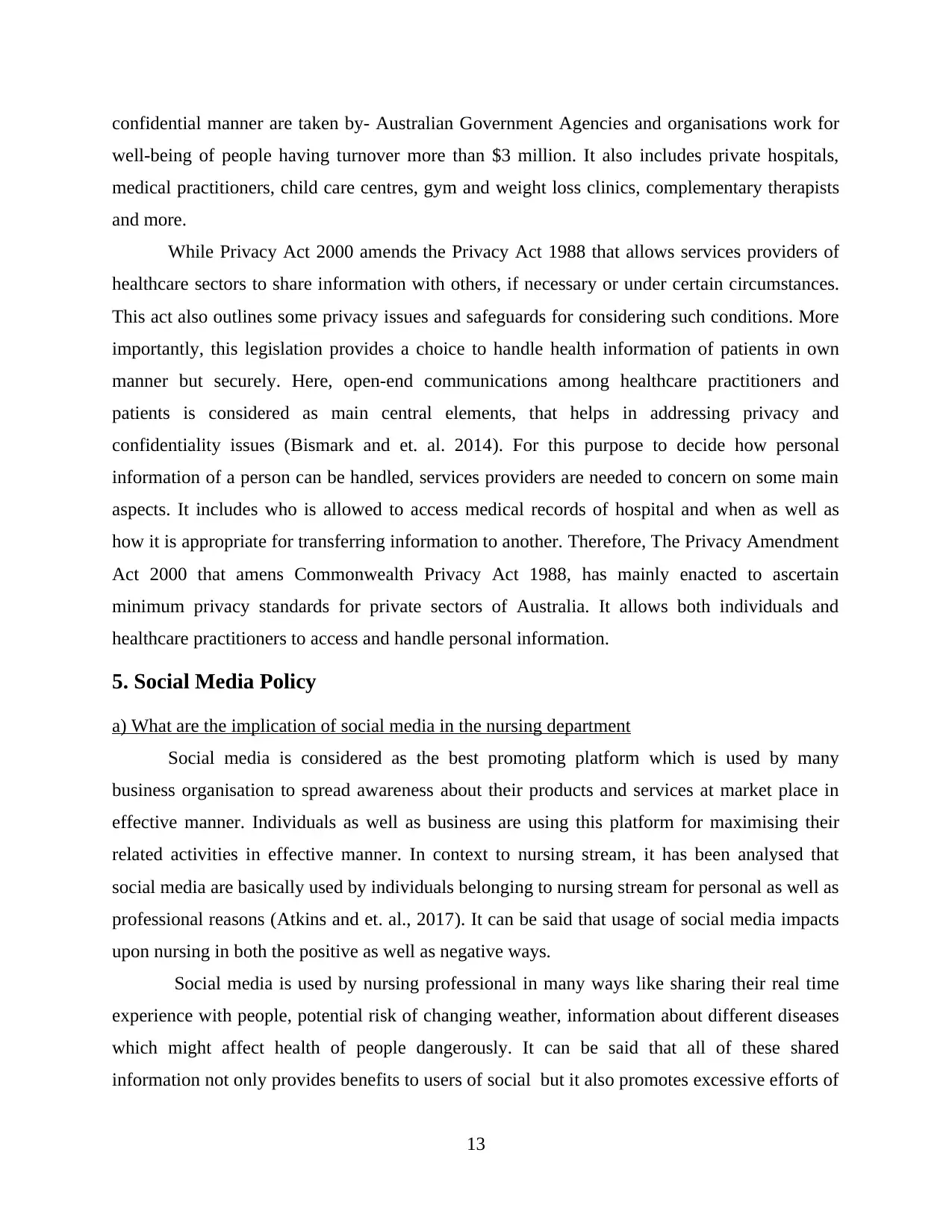
confidential manner are taken by- Australian Government Agencies and organisations work for
well-being of people having turnover more than $3 million. It also includes private hospitals,
medical practitioners, child care centres, gym and weight loss clinics, complementary therapists
and more.
While Privacy Act 2000 amends the Privacy Act 1988 that allows services providers of
healthcare sectors to share information with others, if necessary or under certain circumstances.
This act also outlines some privacy issues and safeguards for considering such conditions. More
importantly, this legislation provides a choice to handle health information of patients in own
manner but securely. Here, open-end communications among healthcare practitioners and
patients is considered as main central elements, that helps in addressing privacy and
confidentiality issues (Bismark and et. al. 2014). For this purpose to decide how personal
information of a person can be handled, services providers are needed to concern on some main
aspects. It includes who is allowed to access medical records of hospital and when as well as
how it is appropriate for transferring information to another. Therefore, The Privacy Amendment
Act 2000 that amens Commonwealth Privacy Act 1988, has mainly enacted to ascertain
minimum privacy standards for private sectors of Australia. It allows both individuals and
healthcare practitioners to access and handle personal information.
5. Social Media Policy
a) What are the implication of social media in the nursing department
Social media is considered as the best promoting platform which is used by many
business organisation to spread awareness about their products and services at market place in
effective manner. Individuals as well as business are using this platform for maximising their
related activities in effective manner. In context to nursing stream, it has been analysed that
social media are basically used by individuals belonging to nursing stream for personal as well as
professional reasons (Atkins and et. al., 2017). It can be said that usage of social media impacts
upon nursing in both the positive as well as negative ways.
Social media is used by nursing professional in many ways like sharing their real time
experience with people, potential risk of changing weather, information about different diseases
which might affect health of people dangerously. It can be said that all of these shared
information not only provides benefits to users of social but it also promotes excessive efforts of
13
well-being of people having turnover more than $3 million. It also includes private hospitals,
medical practitioners, child care centres, gym and weight loss clinics, complementary therapists
and more.
While Privacy Act 2000 amends the Privacy Act 1988 that allows services providers of
healthcare sectors to share information with others, if necessary or under certain circumstances.
This act also outlines some privacy issues and safeguards for considering such conditions. More
importantly, this legislation provides a choice to handle health information of patients in own
manner but securely. Here, open-end communications among healthcare practitioners and
patients is considered as main central elements, that helps in addressing privacy and
confidentiality issues (Bismark and et. al. 2014). For this purpose to decide how personal
information of a person can be handled, services providers are needed to concern on some main
aspects. It includes who is allowed to access medical records of hospital and when as well as
how it is appropriate for transferring information to another. Therefore, The Privacy Amendment
Act 2000 that amens Commonwealth Privacy Act 1988, has mainly enacted to ascertain
minimum privacy standards for private sectors of Australia. It allows both individuals and
healthcare practitioners to access and handle personal information.
5. Social Media Policy
a) What are the implication of social media in the nursing department
Social media is considered as the best promoting platform which is used by many
business organisation to spread awareness about their products and services at market place in
effective manner. Individuals as well as business are using this platform for maximising their
related activities in effective manner. In context to nursing stream, it has been analysed that
social media are basically used by individuals belonging to nursing stream for personal as well as
professional reasons (Atkins and et. al., 2017). It can be said that usage of social media impacts
upon nursing in both the positive as well as negative ways.
Social media is used by nursing professional in many ways like sharing their real time
experience with people, potential risk of changing weather, information about different diseases
which might affect health of people dangerously. It can be said that all of these shared
information not only provides benefits to users of social but it also promotes excessive efforts of
13
Secure Best Marks with AI Grader
Need help grading? Try our AI Grader for instant feedback on your assignments.
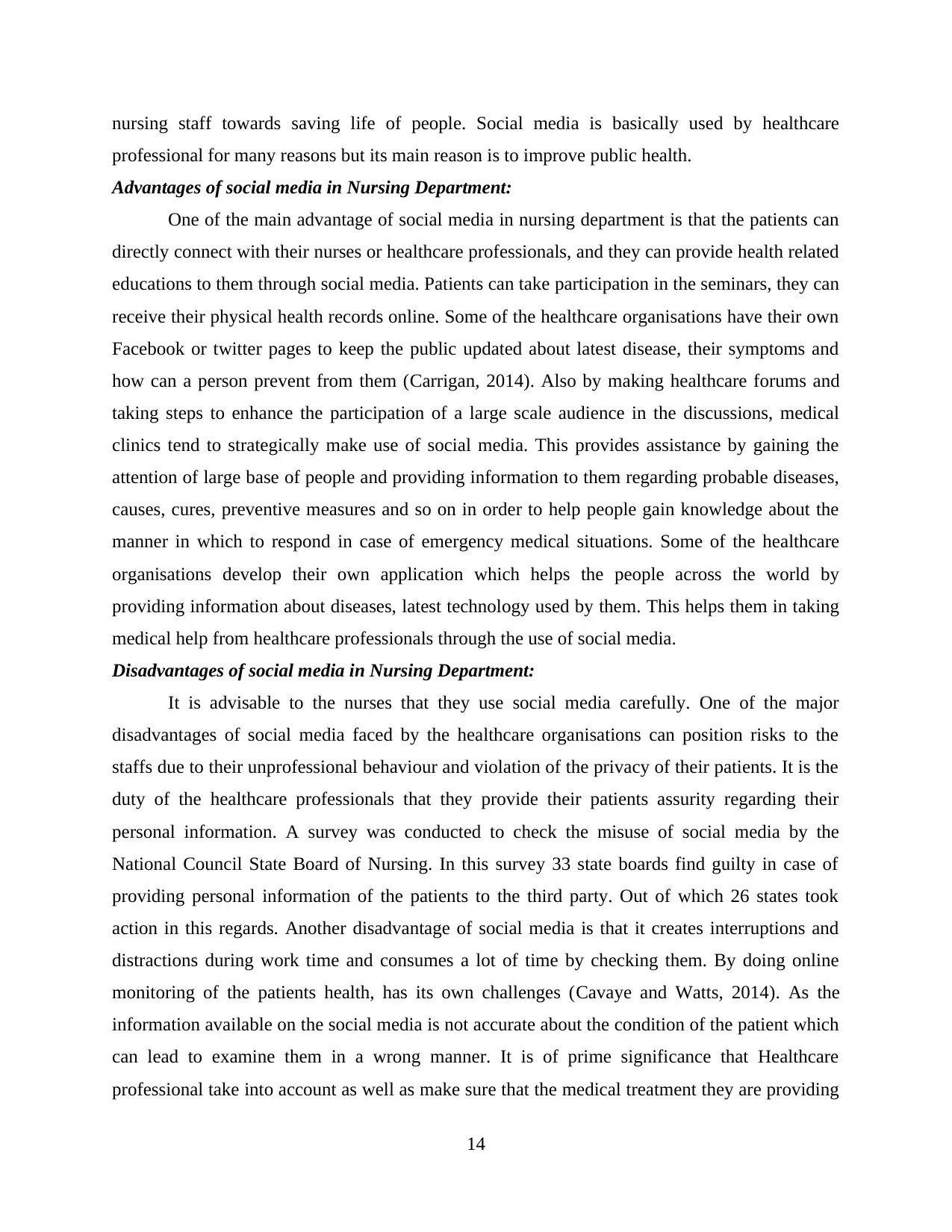
nursing staff towards saving life of people. Social media is basically used by healthcare
professional for many reasons but its main reason is to improve public health.
Advantages of social media in Nursing Department:
One of the main advantage of social media in nursing department is that the patients can
directly connect with their nurses or healthcare professionals, and they can provide health related
educations to them through social media. Patients can take participation in the seminars, they can
receive their physical health records online. Some of the healthcare organisations have their own
Facebook or twitter pages to keep the public updated about latest disease, their symptoms and
how can a person prevent from them (Carrigan, 2014). Also by making healthcare forums and
taking steps to enhance the participation of a large scale audience in the discussions, medical
clinics tend to strategically make use of social media. This provides assistance by gaining the
attention of large base of people and providing information to them regarding probable diseases,
causes, cures, preventive measures and so on in order to help people gain knowledge about the
manner in which to respond in case of emergency medical situations. Some of the healthcare
organisations develop their own application which helps the people across the world by
providing information about diseases, latest technology used by them. This helps them in taking
medical help from healthcare professionals through the use of social media.
Disadvantages of social media in Nursing Department:
It is advisable to the nurses that they use social media carefully. One of the major
disadvantages of social media faced by the healthcare organisations can position risks to the
staffs due to their unprofessional behaviour and violation of the privacy of their patients. It is the
duty of the healthcare professionals that they provide their patients assurity regarding their
personal information. A survey was conducted to check the misuse of social media by the
National Council State Board of Nursing. In this survey 33 state boards find guilty in case of
providing personal information of the patients to the third party. Out of which 26 states took
action in this regards. Another disadvantage of social media is that it creates interruptions and
distractions during work time and consumes a lot of time by checking them. By doing online
monitoring of the patients health, has its own challenges (Cavaye and Watts, 2014). As the
information available on the social media is not accurate about the condition of the patient which
can lead to examine them in a wrong manner. It is of prime significance that Healthcare
professional take into account as well as make sure that the medical treatment they are providing
14
professional for many reasons but its main reason is to improve public health.
Advantages of social media in Nursing Department:
One of the main advantage of social media in nursing department is that the patients can
directly connect with their nurses or healthcare professionals, and they can provide health related
educations to them through social media. Patients can take participation in the seminars, they can
receive their physical health records online. Some of the healthcare organisations have their own
Facebook or twitter pages to keep the public updated about latest disease, their symptoms and
how can a person prevent from them (Carrigan, 2014). Also by making healthcare forums and
taking steps to enhance the participation of a large scale audience in the discussions, medical
clinics tend to strategically make use of social media. This provides assistance by gaining the
attention of large base of people and providing information to them regarding probable diseases,
causes, cures, preventive measures and so on in order to help people gain knowledge about the
manner in which to respond in case of emergency medical situations. Some of the healthcare
organisations develop their own application which helps the people across the world by
providing information about diseases, latest technology used by them. This helps them in taking
medical help from healthcare professionals through the use of social media.
Disadvantages of social media in Nursing Department:
It is advisable to the nurses that they use social media carefully. One of the major
disadvantages of social media faced by the healthcare organisations can position risks to the
staffs due to their unprofessional behaviour and violation of the privacy of their patients. It is the
duty of the healthcare professionals that they provide their patients assurity regarding their
personal information. A survey was conducted to check the misuse of social media by the
National Council State Board of Nursing. In this survey 33 state boards find guilty in case of
providing personal information of the patients to the third party. Out of which 26 states took
action in this regards. Another disadvantage of social media is that it creates interruptions and
distractions during work time and consumes a lot of time by checking them. By doing online
monitoring of the patients health, has its own challenges (Cavaye and Watts, 2014). As the
information available on the social media is not accurate about the condition of the patient which
can lead to examine them in a wrong manner. It is of prime significance that Healthcare
professional take into account as well as make sure that the medical treatment they are providing
14
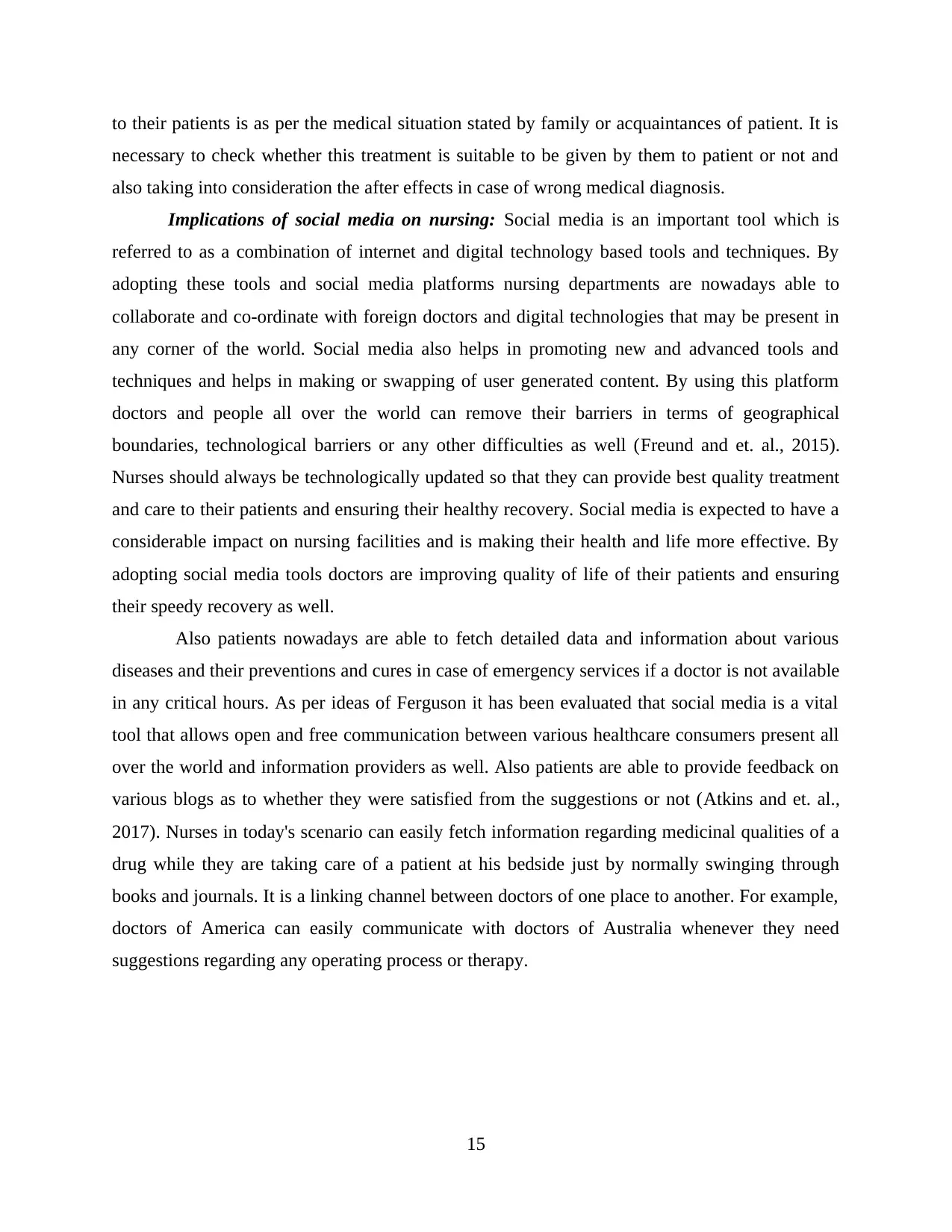
to their patients is as per the medical situation stated by family or acquaintances of patient. It is
necessary to check whether this treatment is suitable to be given by them to patient or not and
also taking into consideration the after effects in case of wrong medical diagnosis.
Implications of social media on nursing: Social media is an important tool which is
referred to as a combination of internet and digital technology based tools and techniques. By
adopting these tools and social media platforms nursing departments are nowadays able to
collaborate and co-ordinate with foreign doctors and digital technologies that may be present in
any corner of the world. Social media also helps in promoting new and advanced tools and
techniques and helps in making or swapping of user generated content. By using this platform
doctors and people all over the world can remove their barriers in terms of geographical
boundaries, technological barriers or any other difficulties as well (Freund and et. al., 2015).
Nurses should always be technologically updated so that they can provide best quality treatment
and care to their patients and ensuring their healthy recovery. Social media is expected to have a
considerable impact on nursing facilities and is making their health and life more effective. By
adopting social media tools doctors are improving quality of life of their patients and ensuring
their speedy recovery as well.
Also patients nowadays are able to fetch detailed data and information about various
diseases and their preventions and cures in case of emergency services if a doctor is not available
in any critical hours. As per ideas of Ferguson it has been evaluated that social media is a vital
tool that allows open and free communication between various healthcare consumers present all
over the world and information providers as well. Also patients are able to provide feedback on
various blogs as to whether they were satisfied from the suggestions or not (Atkins and et. al.,
2017). Nurses in today's scenario can easily fetch information regarding medicinal qualities of a
drug while they are taking care of a patient at his bedside just by normally swinging through
books and journals. It is a linking channel between doctors of one place to another. For example,
doctors of America can easily communicate with doctors of Australia whenever they need
suggestions regarding any operating process or therapy.
15
necessary to check whether this treatment is suitable to be given by them to patient or not and
also taking into consideration the after effects in case of wrong medical diagnosis.
Implications of social media on nursing: Social media is an important tool which is
referred to as a combination of internet and digital technology based tools and techniques. By
adopting these tools and social media platforms nursing departments are nowadays able to
collaborate and co-ordinate with foreign doctors and digital technologies that may be present in
any corner of the world. Social media also helps in promoting new and advanced tools and
techniques and helps in making or swapping of user generated content. By using this platform
doctors and people all over the world can remove their barriers in terms of geographical
boundaries, technological barriers or any other difficulties as well (Freund and et. al., 2015).
Nurses should always be technologically updated so that they can provide best quality treatment
and care to their patients and ensuring their healthy recovery. Social media is expected to have a
considerable impact on nursing facilities and is making their health and life more effective. By
adopting social media tools doctors are improving quality of life of their patients and ensuring
their speedy recovery as well.
Also patients nowadays are able to fetch detailed data and information about various
diseases and their preventions and cures in case of emergency services if a doctor is not available
in any critical hours. As per ideas of Ferguson it has been evaluated that social media is a vital
tool that allows open and free communication between various healthcare consumers present all
over the world and information providers as well. Also patients are able to provide feedback on
various blogs as to whether they were satisfied from the suggestions or not (Atkins and et. al.,
2017). Nurses in today's scenario can easily fetch information regarding medicinal qualities of a
drug while they are taking care of a patient at his bedside just by normally swinging through
books and journals. It is a linking channel between doctors of one place to another. For example,
doctors of America can easily communicate with doctors of Australia whenever they need
suggestions regarding any operating process or therapy.
15
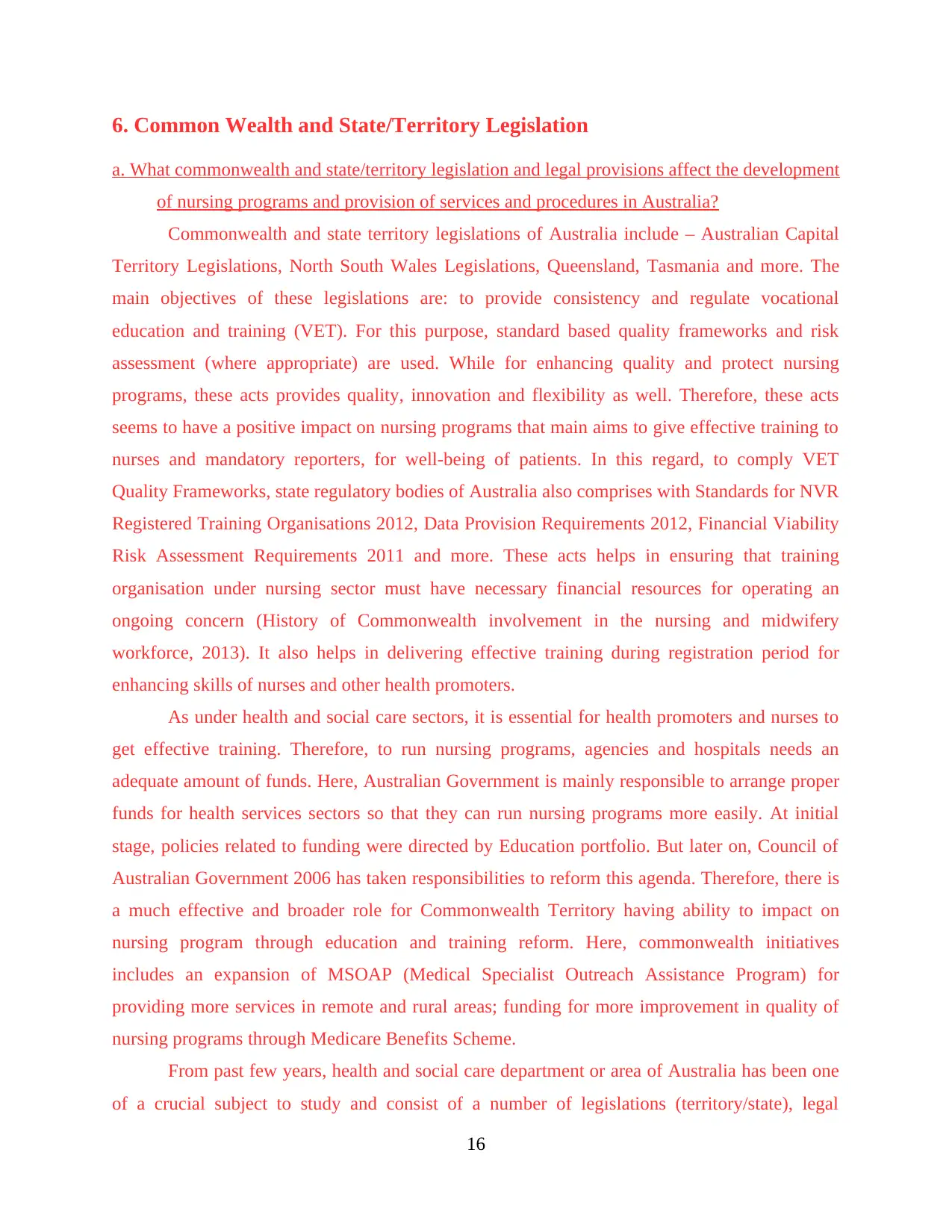
6. Common Wealth and State/Territory Legislation
a. What commonwealth and state/territory legislation and legal provisions affect the development
of nursing programs and provision of services and procedures in Australia?
Commonwealth and state territory legislations of Australia include – Australian Capital
Territory Legislations, North South Wales Legislations, Queensland, Tasmania and more. The
main objectives of these legislations are: to provide consistency and regulate vocational
education and training (VET). For this purpose, standard based quality frameworks and risk
assessment (where appropriate) are used. While for enhancing quality and protect nursing
programs, these acts provides quality, innovation and flexibility as well. Therefore, these acts
seems to have a positive impact on nursing programs that main aims to give effective training to
nurses and mandatory reporters, for well-being of patients. In this regard, to comply VET
Quality Frameworks, state regulatory bodies of Australia also comprises with Standards for NVR
Registered Training Organisations 2012, Data Provision Requirements 2012, Financial Viability
Risk Assessment Requirements 2011 and more. These acts helps in ensuring that training
organisation under nursing sector must have necessary financial resources for operating an
ongoing concern (History of Commonwealth involvement in the nursing and midwifery
workforce, 2013). It also helps in delivering effective training during registration period for
enhancing skills of nurses and other health promoters.
As under health and social care sectors, it is essential for health promoters and nurses to
get effective training. Therefore, to run nursing programs, agencies and hospitals needs an
adequate amount of funds. Here, Australian Government is mainly responsible to arrange proper
funds for health services sectors so that they can run nursing programs more easily. At initial
stage, policies related to funding were directed by Education portfolio. But later on, Council of
Australian Government 2006 has taken responsibilities to reform this agenda. Therefore, there is
a much effective and broader role for Commonwealth Territory having ability to impact on
nursing program through education and training reform. Here, commonwealth initiatives
includes an expansion of MSOAP (Medical Specialist Outreach Assistance Program) for
providing more services in remote and rural areas; funding for more improvement in quality of
nursing programs through Medicare Benefits Scheme.
From past few years, health and social care department or area of Australia has been one
of a crucial subject to study and consist of a number of legislations (territory/state), legal
16
a. What commonwealth and state/territory legislation and legal provisions affect the development
of nursing programs and provision of services and procedures in Australia?
Commonwealth and state territory legislations of Australia include – Australian Capital
Territory Legislations, North South Wales Legislations, Queensland, Tasmania and more. The
main objectives of these legislations are: to provide consistency and regulate vocational
education and training (VET). For this purpose, standard based quality frameworks and risk
assessment (where appropriate) are used. While for enhancing quality and protect nursing
programs, these acts provides quality, innovation and flexibility as well. Therefore, these acts
seems to have a positive impact on nursing programs that main aims to give effective training to
nurses and mandatory reporters, for well-being of patients. In this regard, to comply VET
Quality Frameworks, state regulatory bodies of Australia also comprises with Standards for NVR
Registered Training Organisations 2012, Data Provision Requirements 2012, Financial Viability
Risk Assessment Requirements 2011 and more. These acts helps in ensuring that training
organisation under nursing sector must have necessary financial resources for operating an
ongoing concern (History of Commonwealth involvement in the nursing and midwifery
workforce, 2013). It also helps in delivering effective training during registration period for
enhancing skills of nurses and other health promoters.
As under health and social care sectors, it is essential for health promoters and nurses to
get effective training. Therefore, to run nursing programs, agencies and hospitals needs an
adequate amount of funds. Here, Australian Government is mainly responsible to arrange proper
funds for health services sectors so that they can run nursing programs more easily. At initial
stage, policies related to funding were directed by Education portfolio. But later on, Council of
Australian Government 2006 has taken responsibilities to reform this agenda. Therefore, there is
a much effective and broader role for Commonwealth Territory having ability to impact on
nursing program through education and training reform. Here, commonwealth initiatives
includes an expansion of MSOAP (Medical Specialist Outreach Assistance Program) for
providing more services in remote and rural areas; funding for more improvement in quality of
nursing programs through Medicare Benefits Scheme.
From past few years, health and social care department or area of Australia has been one
of a crucial subject to study and consist of a number of legislations (territory/state), legal
16
Paraphrase This Document
Need a fresh take? Get an instant paraphrase of this document with our AI Paraphraser
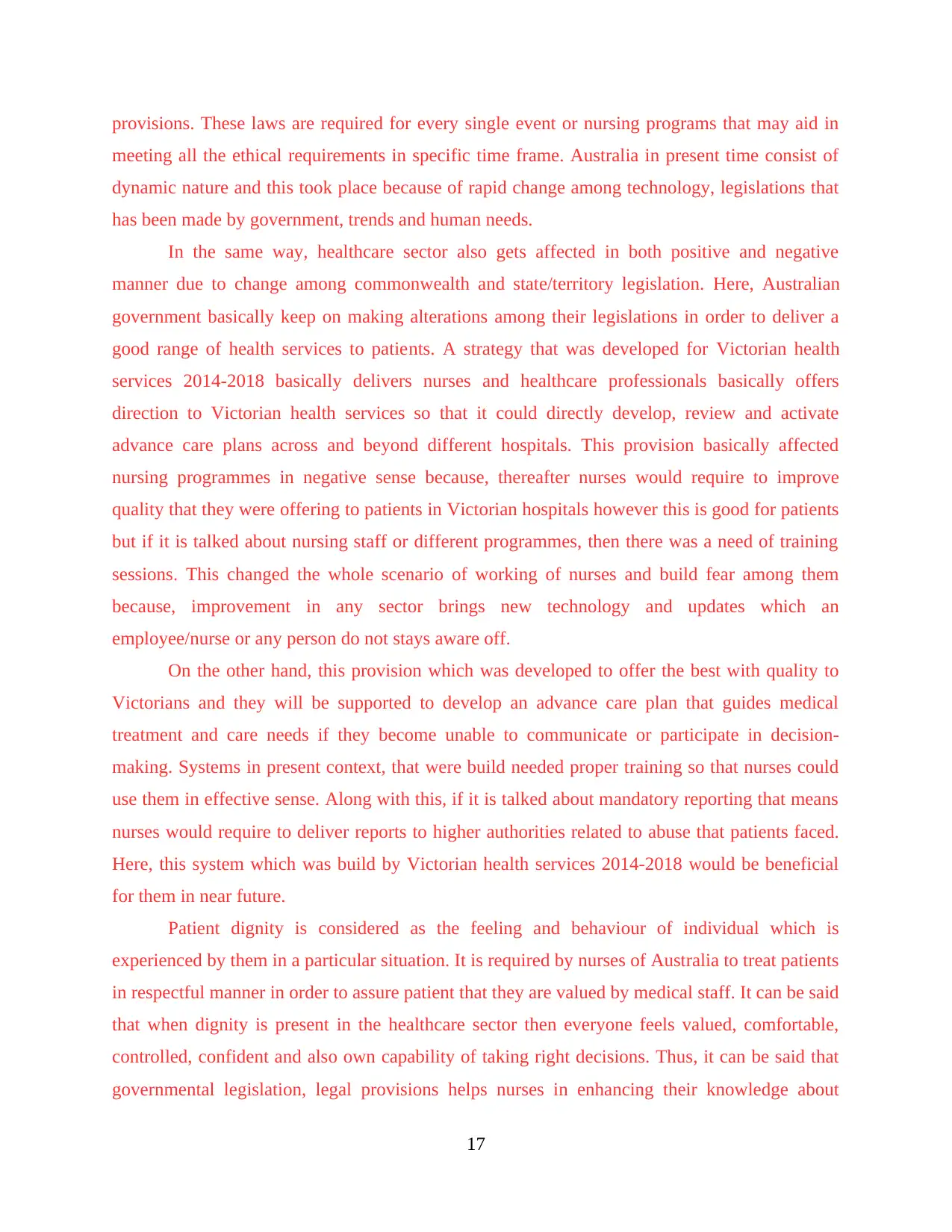
provisions. These laws are required for every single event or nursing programs that may aid in
meeting all the ethical requirements in specific time frame. Australia in present time consist of
dynamic nature and this took place because of rapid change among technology, legislations that
has been made by government, trends and human needs.
In the same way, healthcare sector also gets affected in both positive and negative
manner due to change among commonwealth and state/territory legislation. Here, Australian
government basically keep on making alterations among their legislations in order to deliver a
good range of health services to patients. A strategy that was developed for Victorian health
services 2014-2018 basically delivers nurses and healthcare professionals basically offers
direction to Victorian health services so that it could directly develop, review and activate
advance care plans across and beyond different hospitals. This provision basically affected
nursing programmes in negative sense because, thereafter nurses would require to improve
quality that they were offering to patients in Victorian hospitals however this is good for patients
but if it is talked about nursing staff or different programmes, then there was a need of training
sessions. This changed the whole scenario of working of nurses and build fear among them
because, improvement in any sector brings new technology and updates which an
employee/nurse or any person do not stays aware off.
On the other hand, this provision which was developed to offer the best with quality to
Victorians and they will be supported to develop an advance care plan that guides medical
treatment and care needs if they become unable to communicate or participate in decision-
making. Systems in present context, that were build needed proper training so that nurses could
use them in effective sense. Along with this, if it is talked about mandatory reporting that means
nurses would require to deliver reports to higher authorities related to abuse that patients faced.
Here, this system which was build by Victorian health services 2014-2018 would be beneficial
for them in near future.
Patient dignity is considered as the feeling and behaviour of individual which is
experienced by them in a particular situation. It is required by nurses of Australia to treat patients
in respectful manner in order to assure patient that they are valued by medical staff. It can be said
that when dignity is present in the healthcare sector then everyone feels valued, comfortable,
controlled, confident and also own capability of taking right decisions. Thus, it can be said that
governmental legislation, legal provisions helps nurses in enhancing their knowledge about
17
meeting all the ethical requirements in specific time frame. Australia in present time consist of
dynamic nature and this took place because of rapid change among technology, legislations that
has been made by government, trends and human needs.
In the same way, healthcare sector also gets affected in both positive and negative
manner due to change among commonwealth and state/territory legislation. Here, Australian
government basically keep on making alterations among their legislations in order to deliver a
good range of health services to patients. A strategy that was developed for Victorian health
services 2014-2018 basically delivers nurses and healthcare professionals basically offers
direction to Victorian health services so that it could directly develop, review and activate
advance care plans across and beyond different hospitals. This provision basically affected
nursing programmes in negative sense because, thereafter nurses would require to improve
quality that they were offering to patients in Victorian hospitals however this is good for patients
but if it is talked about nursing staff or different programmes, then there was a need of training
sessions. This changed the whole scenario of working of nurses and build fear among them
because, improvement in any sector brings new technology and updates which an
employee/nurse or any person do not stays aware off.
On the other hand, this provision which was developed to offer the best with quality to
Victorians and they will be supported to develop an advance care plan that guides medical
treatment and care needs if they become unable to communicate or participate in decision-
making. Systems in present context, that were build needed proper training so that nurses could
use them in effective sense. Along with this, if it is talked about mandatory reporting that means
nurses would require to deliver reports to higher authorities related to abuse that patients faced.
Here, this system which was build by Victorian health services 2014-2018 would be beneficial
for them in near future.
Patient dignity is considered as the feeling and behaviour of individual which is
experienced by them in a particular situation. It is required by nurses of Australia to treat patients
in respectful manner in order to assure patient that they are valued by medical staff. It can be said
that when dignity is present in the healthcare sector then everyone feels valued, comfortable,
controlled, confident and also own capability of taking right decisions. Thus, it can be said that
governmental legislation, legal provisions helps nurses in enhancing their knowledge about
17
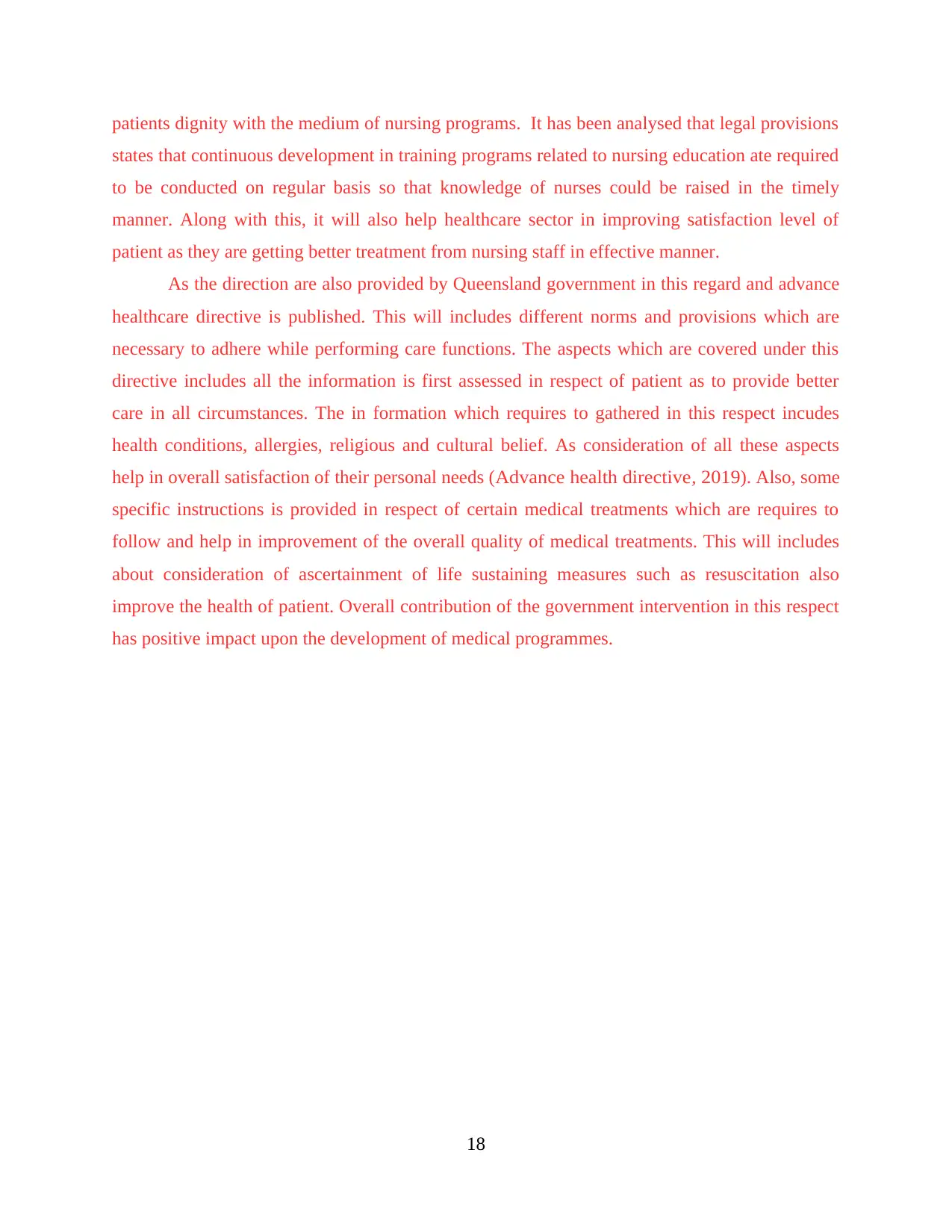
patients dignity with the medium of nursing programs. It has been analysed that legal provisions
states that continuous development in training programs related to nursing education ate required
to be conducted on regular basis so that knowledge of nurses could be raised in the timely
manner. Along with this, it will also help healthcare sector in improving satisfaction level of
patient as they are getting better treatment from nursing staff in effective manner.
As the direction are also provided by Queensland government in this regard and advance
healthcare directive is published. This will includes different norms and provisions which are
necessary to adhere while performing care functions. The aspects which are covered under this
directive includes all the information is first assessed in respect of patient as to provide better
care in all circumstances. The in formation which requires to gathered in this respect incudes
health conditions, allergies, religious and cultural belief. As consideration of all these aspects
help in overall satisfaction of their personal needs ( Advance health directive, 2019). Also, some
specific instructions is provided in respect of certain medical treatments which are requires to
follow and help in improvement of the overall quality of medical treatments. This will includes
about consideration of ascertainment of life sustaining measures such as resuscitation also
improve the health of patient. Overall contribution of the government intervention in this respect
has positive impact upon the development of medical programmes.
18
states that continuous development in training programs related to nursing education ate required
to be conducted on regular basis so that knowledge of nurses could be raised in the timely
manner. Along with this, it will also help healthcare sector in improving satisfaction level of
patient as they are getting better treatment from nursing staff in effective manner.
As the direction are also provided by Queensland government in this regard and advance
healthcare directive is published. This will includes different norms and provisions which are
necessary to adhere while performing care functions. The aspects which are covered under this
directive includes all the information is first assessed in respect of patient as to provide better
care in all circumstances. The in formation which requires to gathered in this respect incudes
health conditions, allergies, religious and cultural belief. As consideration of all these aspects
help in overall satisfaction of their personal needs ( Advance health directive, 2019). Also, some
specific instructions is provided in respect of certain medical treatments which are requires to
follow and help in improvement of the overall quality of medical treatments. This will includes
about consideration of ascertainment of life sustaining measures such as resuscitation also
improve the health of patient. Overall contribution of the government intervention in this respect
has positive impact upon the development of medical programmes.
18
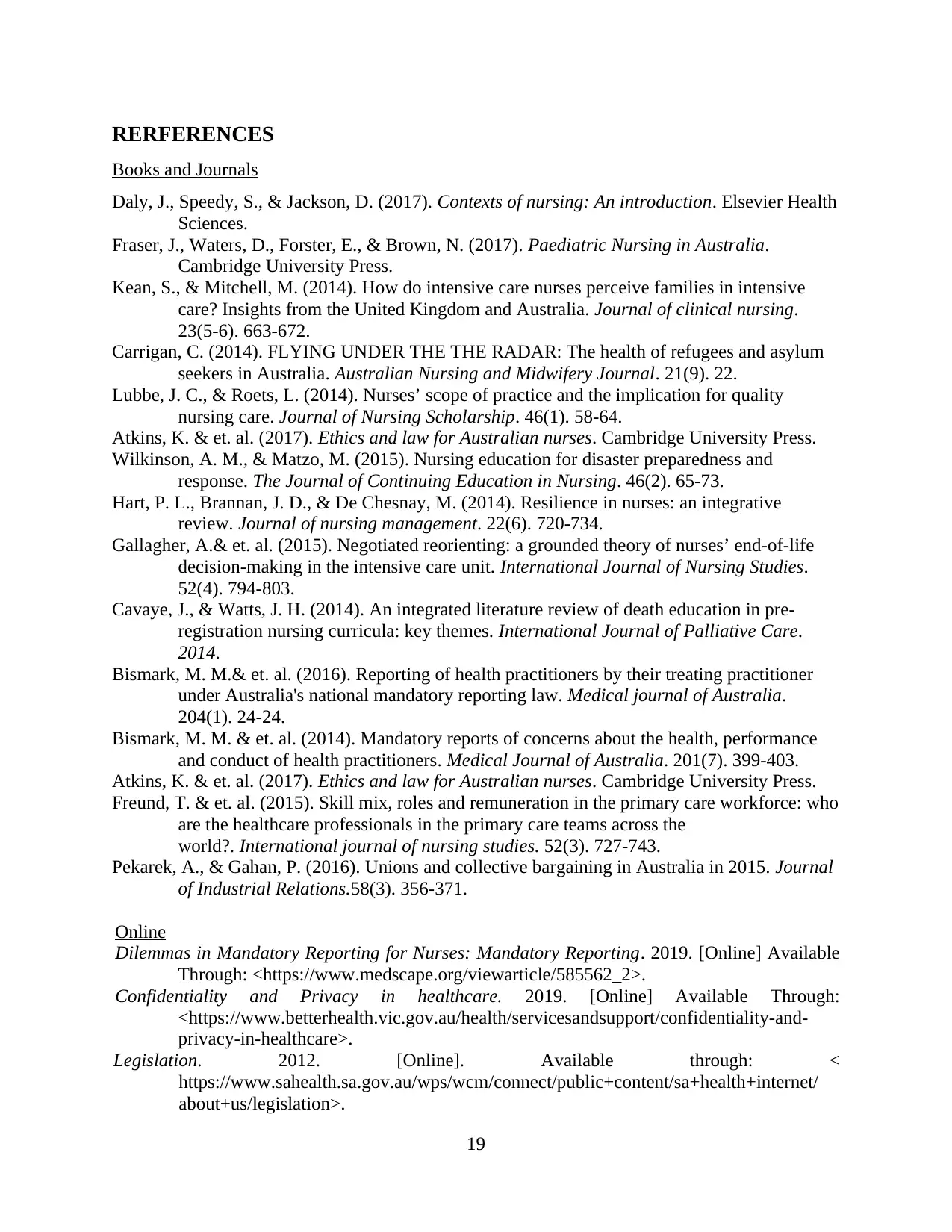
RERFERENCES
Books and Journals
Daly, J., Speedy, S., & Jackson, D. (2017). Contexts of nursing: An introduction. Elsevier Health
Sciences.
Fraser, J., Waters, D., Forster, E., & Brown, N. (2017). Paediatric Nursing in Australia.
Cambridge University Press.
Kean, S., & Mitchell, M. (2014). How do intensive care nurses perceive families in intensive
care? Insights from the United Kingdom and Australia. Journal of clinical nursing.
23(5-6). 663-672.
Carrigan, C. (2014). FLYING UNDER THE THE RADAR: The health of refugees and asylum
seekers in Australia. Australian Nursing and Midwifery Journal. 21(9). 22.
Lubbe, J. C., & Roets, L. (2014). Nurses’ scope of practice and the implication for quality
nursing care. Journal of Nursing Scholarship. 46(1). 58-64.
Atkins, K. & et. al. (2017). Ethics and law for Australian nurses. Cambridge University Press.
Wilkinson, A. M., & Matzo, M. (2015). Nursing education for disaster preparedness and
response. The Journal of Continuing Education in Nursing. 46(2). 65-73.
Hart, P. L., Brannan, J. D., & De Chesnay, M. (2014). Resilience in nurses: an integrative
review. Journal of nursing management. 22(6). 720-734.
Gallagher, A.& et. al. (2015). Negotiated reorienting: a grounded theory of nurses’ end-of-life
decision-making in the intensive care unit. International Journal of Nursing Studies.
52(4). 794-803.
Cavaye, J., & Watts, J. H. (2014). An integrated literature review of death education in pre-
registration nursing curricula: key themes. International Journal of Palliative Care.
2014.
Bismark, M. M.& et. al. (2016). Reporting of health practitioners by their treating practitioner
under Australia's national mandatory reporting law. Medical journal of Australia.
204(1). 24-24.
Bismark, M. M. & et. al. (2014). Mandatory reports of concerns about the health, performance
and conduct of health practitioners. Medical Journal of Australia. 201(7). 399-403.
Atkins, K. & et. al. (2017). Ethics and law for Australian nurses. Cambridge University Press.
Freund, T. & et. al. (2015). Skill mix, roles and remuneration in the primary care workforce: who
are the healthcare professionals in the primary care teams across the
world?. International journal of nursing studies. 52(3). 727-743.
Pekarek, A., & Gahan, P. (2016). Unions and collective bargaining in Australia in 2015. Journal
of Industrial Relations.58(3). 356-371.
Online
Dilemmas in Mandatory Reporting for Nurses: Mandatory Reporting. 2019. [Online] Available
Through: <https://www.medscape.org/viewarticle/585562_2>.
Confidentiality and Privacy in healthcare. 2019. [Online] Available Through:
<https://www.betterhealth.vic.gov.au/health/servicesandsupport/confidentiality-and-
privacy-in-healthcare>.
Legislation. 2012. [Online]. Available through: <
https://www.sahealth.sa.gov.au/wps/wcm/connect/public+content/sa+health+internet/
about+us/legislation>.
19
Books and Journals
Daly, J., Speedy, S., & Jackson, D. (2017). Contexts of nursing: An introduction. Elsevier Health
Sciences.
Fraser, J., Waters, D., Forster, E., & Brown, N. (2017). Paediatric Nursing in Australia.
Cambridge University Press.
Kean, S., & Mitchell, M. (2014). How do intensive care nurses perceive families in intensive
care? Insights from the United Kingdom and Australia. Journal of clinical nursing.
23(5-6). 663-672.
Carrigan, C. (2014). FLYING UNDER THE THE RADAR: The health of refugees and asylum
seekers in Australia. Australian Nursing and Midwifery Journal. 21(9). 22.
Lubbe, J. C., & Roets, L. (2014). Nurses’ scope of practice and the implication for quality
nursing care. Journal of Nursing Scholarship. 46(1). 58-64.
Atkins, K. & et. al. (2017). Ethics and law for Australian nurses. Cambridge University Press.
Wilkinson, A. M., & Matzo, M. (2015). Nursing education for disaster preparedness and
response. The Journal of Continuing Education in Nursing. 46(2). 65-73.
Hart, P. L., Brannan, J. D., & De Chesnay, M. (2014). Resilience in nurses: an integrative
review. Journal of nursing management. 22(6). 720-734.
Gallagher, A.& et. al. (2015). Negotiated reorienting: a grounded theory of nurses’ end-of-life
decision-making in the intensive care unit. International Journal of Nursing Studies.
52(4). 794-803.
Cavaye, J., & Watts, J. H. (2014). An integrated literature review of death education in pre-
registration nursing curricula: key themes. International Journal of Palliative Care.
2014.
Bismark, M. M.& et. al. (2016). Reporting of health practitioners by their treating practitioner
under Australia's national mandatory reporting law. Medical journal of Australia.
204(1). 24-24.
Bismark, M. M. & et. al. (2014). Mandatory reports of concerns about the health, performance
and conduct of health practitioners. Medical Journal of Australia. 201(7). 399-403.
Atkins, K. & et. al. (2017). Ethics and law for Australian nurses. Cambridge University Press.
Freund, T. & et. al. (2015). Skill mix, roles and remuneration in the primary care workforce: who
are the healthcare professionals in the primary care teams across the
world?. International journal of nursing studies. 52(3). 727-743.
Pekarek, A., & Gahan, P. (2016). Unions and collective bargaining in Australia in 2015. Journal
of Industrial Relations.58(3). 356-371.
Online
Dilemmas in Mandatory Reporting for Nurses: Mandatory Reporting. 2019. [Online] Available
Through: <https://www.medscape.org/viewarticle/585562_2>.
Confidentiality and Privacy in healthcare. 2019. [Online] Available Through:
<https://www.betterhealth.vic.gov.au/health/servicesandsupport/confidentiality-and-
privacy-in-healthcare>.
Legislation. 2012. [Online]. Available through: <
https://www.sahealth.sa.gov.au/wps/wcm/connect/public+content/sa+health+internet/
about+us/legislation>.
19
Secure Best Marks with AI Grader
Need help grading? Try our AI Grader for instant feedback on your assignments.
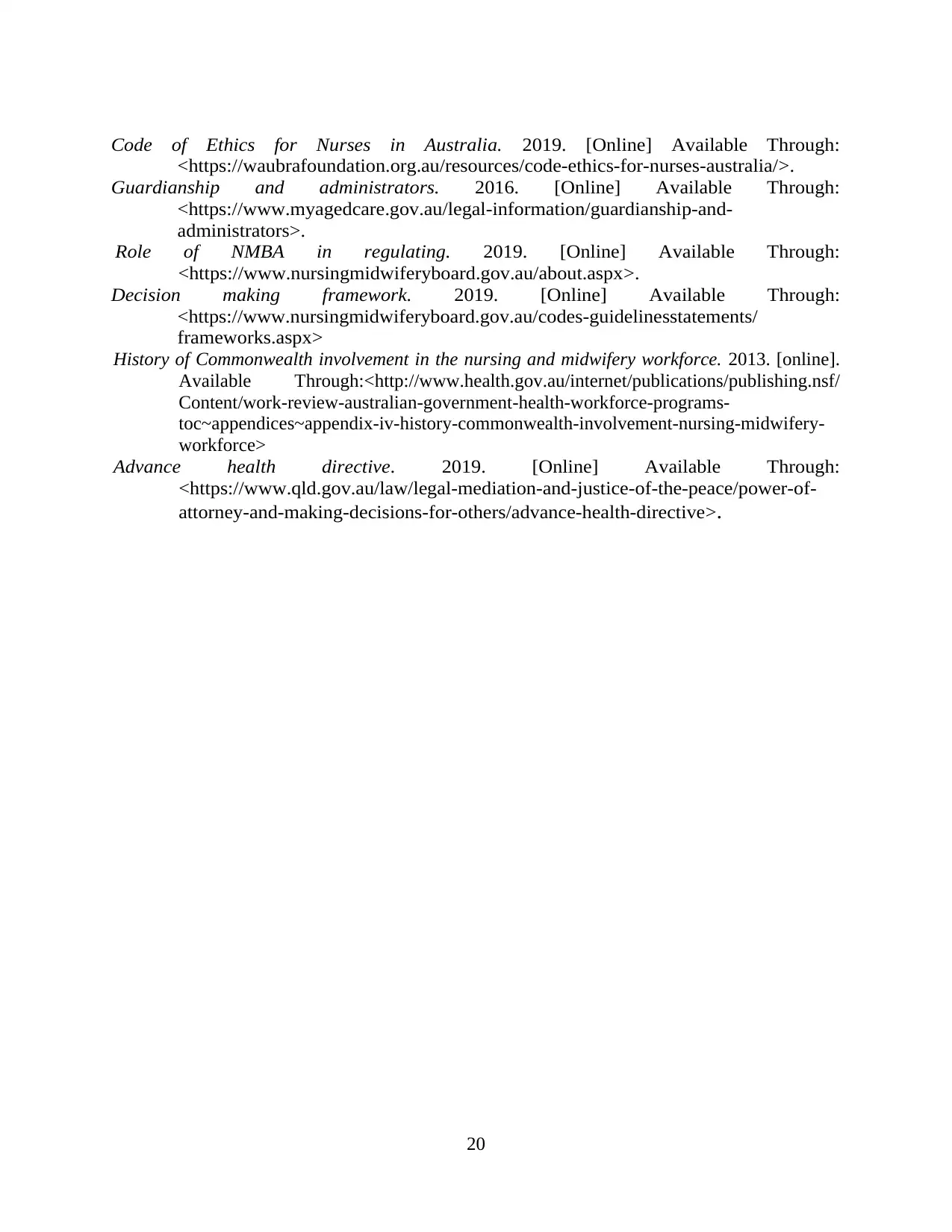
Code of Ethics for Nurses in Australia. 2019. [Online] Available Through:
<https://waubrafoundation.org.au/resources/code-ethics-for-nurses-australia/>.
Guardianship and administrators. 2016. [Online] Available Through:
<https://www.myagedcare.gov.au/legal-information/guardianship-and-
administrators>.
Role of NMBA in regulating. 2019. [Online] Available Through:
<https://www.nursingmidwiferyboard.gov.au/about.aspx>.
Decision making framework. 2019. [Online] Available Through:
<https://www.nursingmidwiferyboard.gov.au/codes-guidelinesstatements/
frameworks.aspx>
History of Commonwealth involvement in the nursing and midwifery workforce. 2013. [online].
Available Through:<http://www.health.gov.au/internet/publications/publishing.nsf/
Content/work-review-australian-government-health-workforce-programs-
toc~appendices~appendix-iv-history-commonwealth-involvement-nursing-midwifery-
workforce>
Advance health directive. 2019. [Online] Available Through:
<https://www.qld.gov.au/law/legal-mediation-and-justice-of-the-peace/power-of-
attorney-and-making-decisions-for-others/advance-health-directive>.
20
<https://waubrafoundation.org.au/resources/code-ethics-for-nurses-australia/>.
Guardianship and administrators. 2016. [Online] Available Through:
<https://www.myagedcare.gov.au/legal-information/guardianship-and-
administrators>.
Role of NMBA in regulating. 2019. [Online] Available Through:
<https://www.nursingmidwiferyboard.gov.au/about.aspx>.
Decision making framework. 2019. [Online] Available Through:
<https://www.nursingmidwiferyboard.gov.au/codes-guidelinesstatements/
frameworks.aspx>
History of Commonwealth involvement in the nursing and midwifery workforce. 2013. [online].
Available Through:<http://www.health.gov.au/internet/publications/publishing.nsf/
Content/work-review-australian-government-health-workforce-programs-
toc~appendices~appendix-iv-history-commonwealth-involvement-nursing-midwifery-
workforce>
Advance health directive. 2019. [Online] Available Through:
<https://www.qld.gov.au/law/legal-mediation-and-justice-of-the-peace/power-of-
attorney-and-making-decisions-for-others/advance-health-directive>.
20


2
1 out of 25
Related Documents
Your All-in-One AI-Powered Toolkit for Academic Success.
+13062052269
info@desklib.com
Available 24*7 on WhatsApp / Email
![[object Object]](/_next/static/media/star-bottom.7253800d.svg)
Unlock your academic potential
© 2024 | Zucol Services PVT LTD | All rights reserved.





